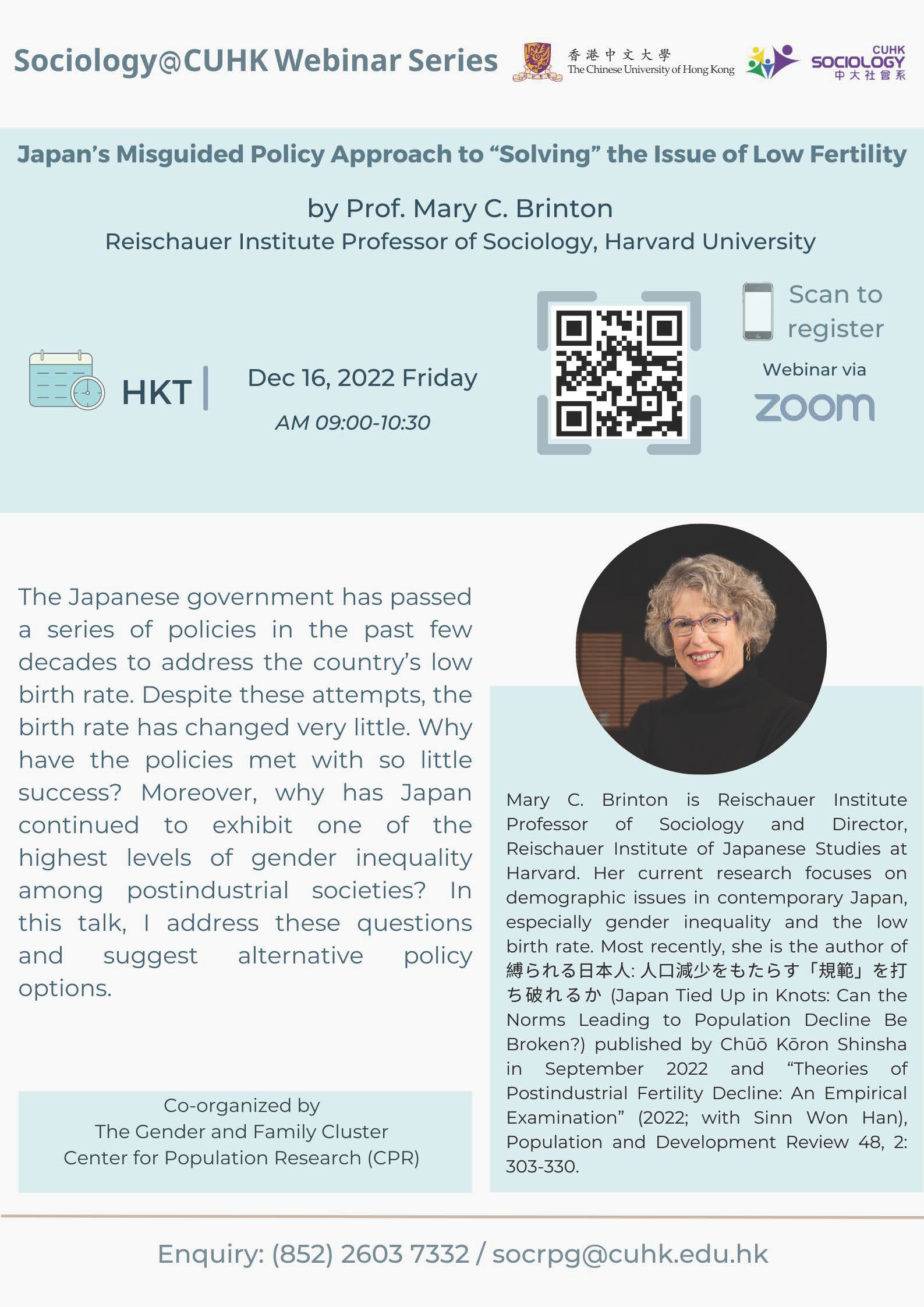
socrpg@cuhk.edu.hk
Abstract:
The Japanese government has passed a series of policies in the past few decades to address the country’s low birth rate. Despite these attempts, the birth rate has changed very little. Why have the policies met with so little success? Moreover, why has Japan continued to exhibit one of the highest levels of gender inequality among postindustrial societies? In this talk, I address these questions and suggest alternative policy options.
Bio:
Mary C. Brinton is Reischauer Institute Professor of Sociology and Director, Reischauer Institute of Japanese Studies at Harvard. Her current research focuses on demographic issues in contemporary Japan, especially gender inequality and the low birth rate. Most recently, she is the author of 縛られる日本人: 人口減少をもたらす「規範」を打ち破れるか (Japan Tied Up in Knots: Can the Norms Leading to Population Decline Be Broken?) published by Chūō Kōron Shinsha in September 2022 and “Theories of Postindustrial Fertility Decline: An Empirical Examination” (2022; with Sinn Won Han), Population and Development Review 48, 2: 303-330.

Department of Government, Harvard University
Faculty Associate, Institute for Quantitative Social Science
Faculty Associate, Fairbank Center for Chinese Studies
Faculty Associate, Weatherhead Center for International Affairs
socrpg@cuhk.edu.hk
About the Webinar
China was the world’s leading superpower for almost two millennia, falling behind only in the last two centuries and now rising to dominance again. What factors led to imperial China’s decline? Based on my new book The Rise and Fall of Imperial China, I will offer a systematic look at the Chinese state from the seventh century through to the twentieth. Focusing on how short-lived emperors often ruled a strong state while long-lasting emperors governed a weak one, I show why lessons from China’s history can help us better understand state building. I argue that Chinese rulers faced a fundamental trade-off that I call the sovereign’s dilemma: a coherent elite that could collectively strengthen the state could also overthrow the ruler. This dilemma emerged because strengthening state capacity and keeping rulers in power for longer required different social networks in which central elites were embedded. I examine how these social networks shaped the Chinese state, and vice versa, and I look at how the ruler’s pursuit of power by fragmenting the elites became the final culprit for China’s fall. Drawing on more than a thousand years of Chinese history, my book highlights the role of elite social relations in influencing the trajectories of state development.
About the Speaker
Yuhua Wang is Professor of Government at Harvard University. He is the author of Tying the Autocrat’s Hands (Cambridge University Press, 2015) and The Rise and Fall of Imperial China (Princeton University Press, 2022). Yuhua received his B.A. from Peking University and Ph.D. from the University of Michigan.

Professor of Sociology and Public Affairs at Princeton University
socrpg@cuhk.edu.hk
Abstract:
Existing work presents mixed findings on the impact of weather events on international mobility. Relying on fine-grained data over a long time span (1980-2019) in the Mexico-U.S. setting, we turn to machine learning (ML) tools to first determine if weather events can predict migration choices of 150,000+ individuals. We use random-forest models which allow us to include a comprehensive list of weather indicators measured at various lags, and to consider complex interactions among the inputs. These models rely on data-driven model selection, optimize predictive performance, but often produce ‘black-box’ results. In our case, the results show that weather indicators offer at best a modest improvement in migration predictions. We then attempt to open the black box, and model the linkages between select weather indicators and migration choices. We find the combination of precipitation and temperature extremes and their particular sequencing to be crucial to predicting weather-driven migration responses out of Mexico. We also show heterogeneity in these responses by household wealth status. Specifically, we find that wealthier households in rural communities migrate in the immediate aftermath of a negative weather shock (relative to the ‘normal’ weather in their community), while poorer households need to experience a positive weather event following a negative one in order to migrate to the United States. This pattern suggests that migration as an adaptation strategy might be available to select households in the developing world, and the most vulnerable might be excluded from resorting on an international trip unless they experience particular sequences of weather events that allow them to raise the necessary funds first.
About the speaker:
Filiz Garip is a Professor of Sociology and Public Affairs at Princeton University. Her research lies at the intersection of migration, economic sociology and inequality. Within this general area, she studies the mechanisms that enable or constrain mobility and lead to greater or lesser degrees of social and economic inequality.

socrpg@cuhk.edu.hk
About the Webinar
Based on a series of empirical studies conducted by the presenter, this talk centers around the higher education in China by viewing it as a pipeline with its inputs and outputs. From the perspective of inputs, this talk will cover the changing patterns of access to and experiences of higher education over the past several decades; From the perspective of outputs, this talk examines the consequences attached to the college credential as well as the transitioning to the subsequent stage of postgraduate education.
About the Speaker
Dr. Hu Anning is Professor of Sociology at Fudan University. His research interests include social inequality, education, religion, trust, culture, and social research methods. Dr. Hu has published over 100 academic articles and three monographs, with research appearing in major sociological outlets, such as British Journal of Sociology, Sociology, Social Science Research, Journal of Marriage and Family, Poetics, Research in Social Stratification and Mobility, Demographic Research, Journal for the Scientific Study of Religion, Sociological Quarterly, Journal of Mathematical Sociology, and The China Quarterly, to name a few.

ccfs@cuhk.edu.hk
About the Webinar
I will present a selection of findings from quantitative historical research on the Chinese family that provide context for studying contemporary trends and patterns. Over the last three decades, analysis of large, individual-level longitudinal databases constructed from population registers like the China Multigenerational Panel Datasets (CMGPD), genealogies, and other sources have transformed the study of the family in historical China in the same way that longitudinal surveys are now transforming the study of the family in contemporary China. Quantitative studies of marriage, reproduction, household and kinship in past times have confirmed, contradicted, or complicated previous understandings of the traditional Chinese family based on classic ethnographic studies from the early and mid-20th century. They have been especially important for moving beyond the analysis of norms and modal behaviors to map variation by social and economic status, and household, kin, and community context. Findings from historical studies of the determinants of timing and prevalence of marriage and remarriage, assortative mating and reproduction are especially relevant for understanding contemporary trends and patterns. Despite this, there has been little integration of historical and contemporary research on the Chinese family beyond assessments of the implications of historical reproductive behaviors for understanding contemporary fertility trends by James Lee, Wang Feng, myself, and others. Thus, in addition to identifying specific findings relevant for interpreting contemporary patterns and trends, I will lay out ideas for reintegrating historical and contemporary family studies in China, emphasizing the prospects for use of publicly available historical data by contemporary researchers.
BACKGROUND
Campbell, Cameron D. and James Z. Lee. 2020. Historical Chinese Microdata. 40 Years of Dataset Construction by the Lee-Campbell Research Group. Historical Life Course Studies. 9(Special Issue 4): 130-157. https://doi.org/10.51964/hlcs9303
China Multigenerational Panel Datasets (CMGPD) Public Release
https://www.icpsr.umich.edu/web/ICPSR/series/265
About the Speaker
Cameron Campbell is a Chair Professor in the Division of Social Science at the Hong Kong University of Science and Technology. His research focuses on demography, stratification and inequality in historical China and in comparative perspective. With other members of the Lee-Campbell Group (LCG), he currently studies official, educational, and professional elites in China from the middle of the 18th century to the present. To this end, he and other members of the LCG pursue a variety of interrelated ‘big data’ studies of specific categories of Qing, Republican, and contemporary elites using datasets they have constructed from archival sources. Campbell leads the study of Qing officialdom from the middle of the 18th century to the beginning of the 20th century by construction and analysis of a database of office holders: the China Government Employee Database-Qing (CGED-Q).
Professor Campbell continues to conduct research on kinship, inequality, and demographic behavior in historical China and in comparative perspective using large multi-generational population databases that he and his collaborators have publicly released, most notably the China Multigenerational Panel Datasets (CMGPD). He has published on a variety of topics including economic, family and social influences on demographic outcomes such as birth, marriage, migration, and death, fertility limitation in historical China, and the role of kin networks in shaping social mobility. His papers have appeared in such journals as American Journal of Sociology, American Sociological Review, Demography, Population Studies, and Demographic Research. A 2004 Guggenheim Fellow and 2017 Changjiang Scholar, he is spending 2022-23 as a Fellow of the Center for Advanced Study in the Behavioral Sciences at Stanford University.

Distinguished Visiting Professor, Department of Sociology, CUHK
Professor of Sociology and Kwoh-Ting Li Professor in Economic Development
Department of Sociology and Freeman Spogli Institute for International Studies, Stanford University
(Online participation): ZOOM
socrpg@cuhk.edu.hk
About the Webinar
The Covid-19 pandemic is the most serious global public health crisis since the 1918 Spanish Flu, with far-reaching and still unfolding consequences. Different countries responded to this crisis in different ways, which provides a “natural experiment” for social science inquiry. Drawing on the U.S. experience in the Covid-19 pandemic, I develop the proposition that, of a multitude of contributing factors, the coupling of environmental discontinuity, biased organizational learning, and the limit of professional logic provided a deadly combination, leading to major misjudgments and consequent delays in the U.S. government’s response to the pandemic. In particular, the significant differences between Covid-19 and previous covid viruses (especially SARS), characteristic of environmental discontinuity, rendered the previously retention of organizational learning, the established professional knowledge and practice problematic, and even made them obstacles to interpreting and responding to information in the face of the new virus. The professional logic that insists on systematic and reliable data and belief in the established knowledge exacerbated these tendencies. These lessons have broader implications for rethinking about organizational design, the professional logic, and public policies in preparation for the next major public health crisis or other types of crises.
About the Speaker
Xueguang Zhou is a Distinguished Visiting Professor in the Department of Sociology at The Chinese University of Hong Kong. He is also a professor of sociology, the Kwoh-Ting Li Professor in Economic Development, and a senior fellow at Freeman Spogli Institute for International Studies, Stanford University. His book The Logic of Governance in China: An Organizational Approach (Cambridge University Press, 2022) summarizes his decade-long research on the institutional logic of governance in China. Professor Zhou’s current research examines patterns of personnel flow in the Chinese bureaucracy and historical origins of the bureaucratic state in China.

Distinguished Professor of Sociology and Asian American Studies
Walter and Shirley Wang Endowed Chair in US-China Relations and Communications
Director of the Asia Pacific Center
University of California, Los Angeles, USA
socrpg@cuhk.edu.hk
About the Webinar
Since the US immigration policy reform in 1965, Chinese America has been drastically transformed from a diasporic community to an ethnic community with tremendous intra-group diversity in origins, socioeconomic backgrounds, and patterns of residential settlement, ethnic formation, and social mobility. This lecture focuses on analyzing how international migration and social change in both sending and receiving societies affect the demographics, ethnic community development, social integration, and sense of belonging among Americans of Chinese descent.
About the Speaker
Min Zhou, Ph.D. (sociology), is Distinguished Professor of Sociology and Asian American Studies, Walter and Shirley Wang Endowed Chair in US-China Relations and Communications, and Director of the Asia Pacific Center at the University of California, Los Angeles. She is an elected member of the American Academy of Arts and Sciences (AAA&S). Her main research areas are in migration & development, race and ethnicity, Chinese diaspora, the sociology of Asia and Asian America, and urban sociology. She has published widely in these areas, including the award-winning book The Asian American Achievement Paradox (with Lee, 2015), The Rise of the New Second Generation (with Bankston, 2016), Contemporary Chinese Diasporas (ed., 2017), Forever Strangers? Contemporary Chinese Immigrants around the World (ed., 2021, in traditional Chinese), and Beyond Economic Migration: Historical, Social, and Political Factors in US Immigration (eds., with Mahmud, 2023). She was the recipient of the 2017 Distinguished Career Award of the American Sociological Association (ASA) Section on International Migration and the 2020 Contribution to the Field Award of the ASA Section on Asia and Asian America.

ccfs@cuhk.edu.hk
About the webinar
This talk will focus on the relationship between fertility and gender equality in both the public and private arena. It argues that gender equality can both reduce and boost fertility rate or fertility desire, generating a “gender-equality paradox of fertility.” In high fertility regime, gender equality in the public sphere facilitates the transition from high to low fertility, while in the low-fertility context, gender equality in the public sphere will continue to reduce fertility due to demographic inertia and the failure of public policy, but gender equality in the private sphere may bring an opposite effect on fertility, pushing very low fertility rates gradually back up. However, the relationship between fertility and gender equality may not be unidimensional, but varies by level of fertility rate, gender and other factors.
About the Speaker
Juhua Yang is a Professor of School of Ethnology and Sociology, Minzu University of China. Her current research focuses on social wellbeing and its articulation with social change. Specifically, she is interested in the determinants and consequences of internal migration, gender inequality throughout individuals’ life course, and family-related policy issues in China. She has recently published books, e.g., Introduction to Social Demography (2020), and In Search of the Urban Dream Migration (2018), and research articles related to gender and the family, children and elderly wellbeing, fertility policy, and migration. She has also won national and international awards.

socrpg@cuhk.edu.hk
About the Webinar
This is a two-part talk. First, I propose that the popularity of K-Pop in the west has transformative possibilities for the lived experiences of Asian Americans. I will introduce K-Pop and BTS in particular. Second, I will present a working paper (co-authored with Wonseok Lee, School of Music, Ohio State University) titled, “Are Friends Electric? The Influence of 1980s British New Wave on 2020s K-Pop.” Given the centrality of the music video to the development of both K-pop and the British New Wave, we argue that there is a shared musical and visual aesthetic between these two genres. Our paper is also accompanied by a YouTube playlist of the music videos we analyze.
About the Speaker
Grace Kao is IBM Professor of Sociology, Professor of Ethnicity, Race, and Migration (by Courtesy), Faculty Director of Education Studies, and Director of the Center for Empirical Research on Stratification and Inequality (CERSI) at Yale University. She studies race, ethnicity, and immigration as they collectively relate to education and relationships among young people. She also has interests in the effects of migration on young people and has written papers on these topics in Mexico, China, and Spain. She is Past Vice-President of the American Sociological Association and has served on the Boards of the Population Association of America and the Association for Asian American Studies. Her work has been published in many premium journals such as American Sociological Review, American Journal of Sociology, Annual Review of Sociology, and Social Forces. According to Google Scholar, her work has been cited about 14,000 times.

Professor of sociology at Zhejiang University, and the Max Palevsky Professor Emeritus of Sociology at the University of Chicago.
socrpg@cuhk.edu.hk
About the Webinar
Structure/mechanism explanation is the core of sociological analysis. But why does it have to be? For example, why is the explanation in physics centering on laws rather than the structures/mechanisms? And what is the relationship between structures and mechanisms in sociology? Specifically, do structures determine mechanisms or vice versa, or are there any other kinds of explanations? Driven by these confusions, I integrate my physics, chemistry, biology, and social sciences knowledge to propose a unified model that captures a constantly evolving and complex relationship between structure/ mechanism, formed immediately after the Big Bang. Based on this model, I discuss how the structure-mechanism relationship evolves, what are the patterns behind, as well as what are the model’s implications for social analyses.
About the Speaker
Professor Zhao Dingxin is professor of sociology at Zhejiang University, and the Max Palevsky Professor Emeritus of Sociology at the University of Chicago. Professor Zhao’s research covers historical sociology, social movement and social science methods. His book, The Power of Tiananmen, published by the University of Chicago Press, won the Best Book Award for Asian Studies in 2001 and for Collective Action and Social Movement Studies in 2002 from the American Sociological Association. The Confucian Legalist State, published by the Oxford University Press in 2015, won the Best Book Award for Political Sociology from the American Sociological Society in 2016.

Department of Sociology, The Chinese University of Hong Kong.
ccfs@cuhk.edu.hk
About the Webinar
In the early 1970s, the balkanization of the US labor market into “men’s occupations” and “women’s occupations” began to unravel, as women entered the professions and other male- typed sectors in record numbers. This decline in gender segregation continued on for several decades but then suddenly stalled at the turn of the century and shows no signs of resuming. Although the stall is itself undisputed, its sources remain unclear. Based on her most recent work published in the Proceedings of the National Academy of Sciences in coauthorship with Dr. David Grusky, Dr. Zhu showed that a resurgence in segregation-inducing forms of intergenerational transmission stands behind the recent stall. Far from serving as impartial conduits, fathers are now disproportionately conveying male-typed occupations to their sons, whereas mothers are effectively gender-neutral in their transmission outcomes. This segregative turn among fathers accounts for 47% of the stall in the gender segregation trend (between 2000 and 2018), while the earlier integrative turn among fathers accounts for 34% of the initial downturn in segregation (between 1972 and 1999). It follows that a U-turn in intergenerational processes lies behind the U-turn in gender segregation.
About the Speaker
Ling Zhu received an MS in Statistics and a PhD in Sociology from Stanford University. Before moving to Hong Kong, she was a post-doctoral fellow at the Stanford Center for Poverty and Inequality. Her overarching research interests consist of two substantive topics and one methodological theme: (1) state governance in authoritarian regimes – how the bureaucratic organizations are structured and the bureaucrats are incentivized to maintain a delicate balance between political control (which requires power centralization) and regional development (which requires power de-centralization), (2) mechanisms of reproducing economic inequality, gender segregation, and family advantages/disadvantages in China and in the United States, and (3) understanding misuses of causal inference methodology.

socrpg@cuhk.edu.hk

socrpg@cuhk.edu.hk
Abstract
Advancement of emerging technologies such as the Internet of Things (loT), big data, artificial intelligence (Al) and machine learning has created opportunities for sociologists to promote the field of computational sociology. In this webinar, the speaker will discuss latest research in computational sociology, including his own work on social media, machine learning, and the Global Burden of Disease (GBD). The speaker will also explore the contributions of computational sociology to emerging technologies in turn.
About the speaker
Ricky Leung obtained his PhD in sociology from the University of Wisconsin-Madison. He is now Associate Professor at the University at Albany School of Public Health, and Track Director for Health Policy and Management. Dr Leung’s research covers organization theory, social networks, and health. He has published widely in these areas, and he has obtained multiple grants to support his research. Outside the academia, Dr Leung has been a senior consultant for government agencies and business organizations, such as the New York State Department of Health, Johnson and Johnson, and other community organizations.

Language: Mandarin (普通話)
講座摘要:
自20世纪80年代以来,中国内地离婚率的上升趋势初见端倪;进入21世纪后,随着内地离婚率的持续上升,越来越多的未成年人生活在因父母离婚造成的单亲家庭或继亲家庭中。本次讲座关注中国内地父母离婚对子女青少年期和成年后的发展会产生怎样的影响,比如,在学业和社会成就上或是在家庭生活中,是不是来自父母离异家庭的孩子表现更差?基于对国内多个数据库的定量分析,本次讲座将介绍中国离异单亲家庭的特征和所处的社会环境;在中国式离婚的背景下,探讨父母离婚和单亲抚育对子女少儿阶段学业、心理、行为的影响,以及对子女成年后的成就和婚姻行为的影响;此外,还将探讨父母婚姻内的夫妻争吵对孩子的影响。
講座人介紹:
张春泥,社会学博士,现为北京大学社会学系长聘副教授。主要研究领域为社会人口学、社会不平等研究,具体包括中国人口转型与婚姻变迁、教育不平等、代际社会流动、城乡人口流动、中国宗教测量等。近年来已就上述议题在《社会学研究》、《社会》、PNAS、Chinese Sociological Review, China Economic Review等国内外刊物发表过多篇文章。完成国家社科基金项目课题“当代中国单亲、重组家庭分布状况及其对子女抚养的影响研究”,就该议题所著专著《离异家庭的孩子们》于2019年由社会科学文献出版社出版。此外,主持或参与设计过若干个社会调查项目,2021年起成为北京大学社会科学调查中心主持的“中国家庭追踪调查”(China Family Panel Studies, CFPS)的协同负责人(Co-PI)。

socrpg@cuhk.edu.hk
Abstract
Researchers investigating immigrants’ economic practices celebrate ethnic entrepreneurship as an alternative socioeconomic mobility strategy: Immigrants seize emerging market opportunities and utilize ethnic resources to achieve economic advancement when their entry into the mainstream labor market is blocked by language barriers or discriminat ion. However, ethnic business can be exploitative and thereby constrain migrants’ social economic mobility in the host society. This is especially likely when ethnic business is used as a channel for labor migration in a restrictive migration regime, trapping migrants in a narrow economic niche. Excessive concentration in one type of business leads to involution, characterized by low road competition within the community and diminishing returns. This study uses the case of Nepalese immigrants’ restaurant business in Japan to illustrate this pitfall of ethnic entrepreneurship. It highlights the roles of the immigration regime and the migration industry in creating involution. The paper argues that an involuted ethnic business creates increasingly precarious situations that aggravate co-ethnic exploitation and fragment ethnic community.
About the speaker
Gracia Liu-Farrer (Ph.D. Sociology, University of Chicago), is Professor at the Graduate School of Asia-Pacific Studies, and Director of Institute of Asian Migration at Waseda University, Japan. Her research examines immigrants’ economic, social and political practices in Japan, and the global mobility of students and professional migrants. She is the author of books Labor Migration from China to Japan: International Students, Transnational Migrants (Routledge, 2011), Handbook of Asian Migrations (co-edited with Brenda Yeoh, Routledge, 2018), and Immigrant Japan: Mobility and Belonging in an Ethno-nationalist Society (Cornell University Press, 2020). She has also published over 50 book chapters and journal articles in leading migration and area studies journals.

socrpg@cuhk.edu.hk
Abstract
Social inequalities in health are so large, so widespread across contexts, and so durable over time that social epidemiologists conceptualize unequal social positions as fundamental causes of health inequalities. Such fundamental causes are connected to health through multiple mechanisms that change over time as population health changes. But unequal distributions of social positions are themselves variable across institutional contexts and over time. Such institutional variability thus carries major implications for the distribution of population health. In this presentation, I sketch a new theory of social inequalities in health that builds on political-sociological insights into how the rules of the game create winners and losers. I then show how this institutional approach to health inequalities sheds new light on several challenging issues in the field of social epidemiology, including potential health-for-equity tradeoffs, intersectional health inequalities, and the so-called Nordic Paradox.
About the speaker
Jason Beckfield is the Robert G. Stone Jr. Professor of Sociology at Harvard University, where he is also the Associate Director of the Center for Population and Development Studies. He took his PhD. in Sociology in 2005 at Indiana University in Bloomington, and later taught at the University of Chicago before joining the Harvard faculty in 2007. His research and teaching are in the areas of social stratification, political sociology, population health, and climate change. Currently, he is investigating the sociology of energy transitions, with a focus on the petrochemical-rich region of the United States Gulf Coast.

Professor of Sociology, Director of Asian/Asian American Studies and the Provost Faculty Fellow on internationalization at Syracuse University.
ccfs@cuhk.edu.hk
About the webinar
Ambitious and Anxious offers a multifaceted analysis of the new wave of Chinese students based on research in both Chinese high schools and American higher-education institutions. I argue that these students’ experiences embody the duality of ambition and anxiety that arises from transformative social changes in China. These students and their families have the ambition to navigate two very different educational systems and societies. Yet the intricacy and pressure of these systems generate a great deal of anxiety, from applying to colleges before arriving, to studying and socializing on campus, and to looking ahead upon graduation. This book also provides policy implications from student recruitment to career services.
About the Speaker
Yingyi Ma is a Professor of Sociology, Director of Asian/Asian American Studies and the Provost Faculty Fellow on internationalization at Syracuse University. Her monograph Ambitious and Anxious has won Best Book Award from CIES Higher Education SIG in 2021. She is a Public Intellectual Fellow at the National Committee on US-China Relations.

10 -12 May 2022 (Tue to Thu) 9 to 11 am (Hong Kong Time)
sociology@cuhk.edu.hk
Conventional causal parameters, such as the average treatment effect (ATE), reflect how the mean outcome in a population or subpopulation would change if all units received treatment versus control. Real-world policy changes, however, are often incremental, changing the treatment status for only a small segment of the population who are at or near “the margin of participation.” To mimic real-world policy changes, two parallel lines of literature have developed in statistics/epidemiology and in economics/sociology that define, identify, and estimate what we call interventional effects and marginal interventional effects. The goal of this workshop is to introduce these two lines of literature, unify them under a common set of notation and definitions, propose new identification and estimation results that will be illustrated with two examples.
Workshop outline
Day 1 (May 10): Causal inference with observational data
Day 2 (May 11): Instrumental variables and marginal treatment effects
Day 3 (May 12): Interventional effects
Remarks
Maximum number of participants will be 30. Priority will be given to members and alumni of the Department of Sociology and those with prior training in the counterfactual approach to causal inference.
About the Speaker
Prof. Xiang Zhou is an associate professor in the Department of Sociology at Harvard University. He is also a faculty affiliate at the Weatherhead Center for International Affairs, Harvard Institute for Quantitative Social Science, Harvard Center for Population and Development Studies, and Fairbank Center for Chinese Studies. His research broadly concerns inequality, education, causal inference, and computational methods. His work has appeared in American Sociological Review, American Journal of Sociology, Social Forces, Journal of Political Economy, Proceedings of the National Academy of Sciences, among other peer-reviewed journals. Before coming to Harvard, Zhou worked as a postdoctoral research associate at Princeton University. He received a PhD in Sociology and Statistics from the University of Michigan in 2015.

socrpg@cuhk.edu.hk

ccfs@cuhk.edu.hk
About the Webinar:
China has witnessed rising cohabitation and robust marriage at the same time. This talk draws on survey and interview data from Chinese cities in the Pearl River Delta to address two research questions: 1) perceptions of cohabitation and the linkage between cohabitation and marriage; 2) perceptions of family labor division among cohabiting couples. For the first research question, quantitative results suggest generally tolerant perceptions of cohabitation and more divided views about the delinking of cohabitation and marriage. Qualitative analyses illustrate that women embrace flexible intimacy to make the best marriage choice, while men try to link cohabitation and marriage to prove their economic capability and sexual responsibility. For the second research question, most cohabiting couples belong to either “intended egalitarian” unions, or “discordant” unions with a typical “traditional man and egalitarian woman” combination. Under China’s materialistic turn that enhances market risks and the state-supported intimate turn that privatizes family matters, this study illustrates the persisting gender inequalities in private life, the uneven diffusion of egalitarian family ideals, and the mixed traditional expectations and individualistic desires.
About the Speaker:
Jing Song is an Associate Professor in Gender Studies Programme at The Chinese University of Hong Kong and a Researcher (by courtesy) at Shenzhen Research Institute, The Chinese University of Hong Kong. She got her BA and MA in sociology at Peking University (China) and PhD in sociology at Brown University (USA). Prof. Song studies gender and family issues with a focus on work and property in urbanization and migration processes, especially women’s entrepreneurship, family life, and social status as shaped by state and market. She has published in China Quarterly, Urban Studies, Journal of Rural Studies, Journal of Contemporary China, Work Employment and Society, The China Review, Eurasian Geography and Economics, Housing Studies, Population Space and Place, Journal of Sociology, Journal of Chinese Sociology, Journal of Comparative Family Studies, Asian Anthropology, Chinese Journal of Sociology etc. Her book Gender and Employment in Rural China was published by Routledge in 2017.

Associate Professor at University of Macau
Abstract
In recent years, exposés on the trafficking of women have caught the public’s attention in China. However, due to data scarcity, the scope and nature of such criminal activity are not well understood. The authors of this study provide a new angle in the analysis of human trafficking by digitizing and analyzing court sentencing documents on trafficking in China during 2014–2015. Through mapping court data to geographic information and performing network analysis, the study presented a comprehensive picture of intra-provincial, inter-provincial, and international trafficking patterns. The data showed that international trafficking has become the largest category in the trafficking of women, and victims were typically young women in their 20s originating from Vietnam, Myanmar, and North Korea who were sold into central provinces. Domestically, inter-provincial trafficking outnumbers intra-provincial cases. Across provincial borders, women were trafficked from southwest to central provinces. Intra-provincial trafficking was concentrated in four provinces: Henan, Anhui, Shandong, and Hebei.
About the Speaker
Tianji Cai is an Associate Professor at University of Macau. He received his PhD degree at University of North Carolina at Chapel Hill in 2010. His research interests concentrate on new forms of data and new methods of analysis. Reflecting on his broad intellectual pursuits, his research topics are diverse, ranging from methodological, such as quantitative methods and data mining, to substantive ones, such as gene-environmental interplay, adolescent health behaviors and crimes. He has published widely in leading international journals including American Sociological Review, American Journal of Sociology, Demography, Sociological Methodology, Sociological Methods & Research, Chinese Sociological Review, Child Abuse & Neglect, International Journal of Drug Policy and Lancet etc.

sociology@cuhk.edu.hk
About the Webinar
Rising affective polarization, or contempt for members of opposing political parties, is often assumed to drive anti-democratic attitudes, such as support for undemocratic candidates, support for partisan violence, and prioritizing partisan ends over democratic means. Researchers have identified interventions that successfully reduce affective polarization, but it remains unclear whether these interventions reduce anti-democratic attitudes. In this talk, I will present results from high-powered experimental tests of two previously established depolarization interventions, one a correction of misperceptions of the views of outpartisans, the other an invitation to think about interpartisan friendships (total N = 4,512). While we find that these depolarization interventions reliably reduce affective polarization, we do not find compelling evidence that these reductions translate into reduced support for undemocratic candidates, support for partisan violence, or prioritizing partisan ends over democratic means. Thus, efforts to strengthen pro-democratic attitudes should target these outcomes directly, rather than following the current practice of focusing on affective polarization as a proxy. More broadly, these findings call into question the previously assumed causal link of affective polarization on anti-democratic attitudes.
About the Speaker
Prof. James Chu is an Assistant Professor of Sociology at Columbia University, where he studies social stratification, economic and organizational sociology, political polarization, and the sociology of education. He writes about social institutions and their role in reproducing inequality and conflict. He also evaluates potential solutions to these problems. He relies on social network analysis, field experiments, and quasi-experimental methods of causal inference. Prof. Chu is currently a co-organizer of the Strengthening Democracy Challenge, which crowdsources interventions to reduce anti-democratic attitudes, support for partisan violence, and partisan animosity from practitioners and academics from across the social sciences. They will run a massive online experiment to test these interventions. Prof. Chu’s work can be found in journals like the American Journal of Sociology, Social Forces, Proceedings of the National Academy of Sciences, Journal of Public Analysis and Management, and Journal of Labor Economics.

sociology@cuhk.edu.hk
About the Webinar
Hypogamous marriages, in which the wife has more education than the husband, have become more prevalent thanks to recent improvement in educational attainment, especially women’s. Does educational hypogamy indicate wives’ earnings advantage at time of marriage? How do earnings change after marriage among husbands and wives of various educational pairings? Using data from the National Longitudinal Study of Youth 1979, we compare wives’ and husbands’ earnings up to ten years after first marriage. College-educated women in hypogamous marriage have lower earnings and lag behind their husbands in earnings less than college-educated women in homogamous marriage. The fixed effects analyses reveal that having children penalizes earnings to a lesser extent for college-educated women in hypogamous marriage than for college-educated women in homogamous marriage and gains earnings less for the husbands in hypogamous marriage than those in homogamous marriage. As a result, marriage premium for men and marriage penalty for women appear to operate differently among hypogamous couples.
About the Speaker
Zhenchao Qian is a professor of Sociology and Associate Director of Population Studies and Training Center at Brown University. His research areas include social demography, stratification, and inequality. More specifically, he studies “who marries whom” and “who lives with whom,” their patterns, trends, and consequences. He explores who are available in marriage markets and how men and women pair up to form marital and cohabiting unions in terms of age, educational attainment, race and ethnicity, and nativity. Such assortative mating patterns help reveal openness of stratification systems, social distance among social groups, and salience of group boundaries. In addition, he investigates how assortative mating patterns, changes in marital status, and marital transitions influence individuals’ wellbeing. He is also interested in topics including racial identification among children born to interracial couples, immigrant integration in the United States, and social and family change in China.
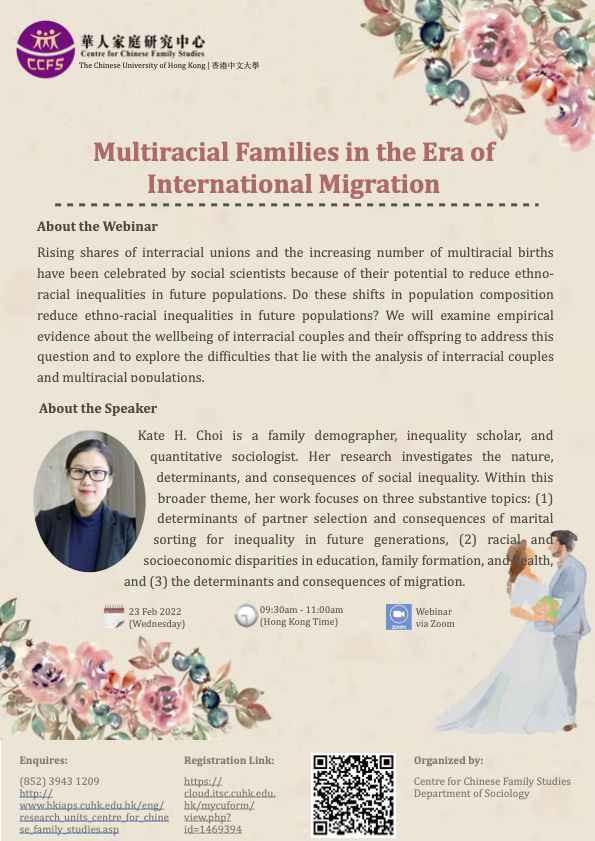
ccfs@cuhk.edu.hk
About the Webinar:
Rising shares of interracial unions and the increasing number of multiracial births have been celebrated by social scientists because of their potential to reduce ethno-racial inequalities in future populations. Do these shifts in population composition reduce ethno-racial inequalities in future populations? We will examine empirical evidence about the wellbeing of interracial couples and their offspring to address this question and to explore the difficulties that lie with the analysis of interracial couples and multiracial populations.
About the Speaker:
Kate H. Choi is a family demographer, inequality scholar, and quantitative sociologist. Her research investigates the nature, determinants, and consequences of social inequality. Within this broader theme, her work focuses on three substantive topics: (1) determinants of partner selection and consequences of marital sorting for inequality in future generations, (2) racial and socioeconomic disparities in education, family formation, and health, and (3) the determinants and consequences of migration.

sociology@cuhk.edu.hk
About the Webinar
Using a mixed method approach, I summarize a recent research program to study the spatial dispersion of Chinese immigrants from New York City to more remote and rural areas of the country. I highlight a new theoretical framework to understand the spatial dispersion of immigrants and the emergence of immigrant business patterns in new immigrant destinations. Finally, I discuss implications of this research for the assimilation paradigm, labor market for low-skilled immigrants, race relations, and continuing linkages between New York City and new immigrant destinations.
About the Speaker
Prof. Zai Liang is a Professor of Sociology at the University at Albany and Visiting Chair Professor at Xi’an Jiaotong University. He is the former chair of Asia and Asian American section of the American Sociological Association and was a visiting scholar at the Russell Sage Foundation in New York City during 2014-2015. He is the recipient of the 2017-2018 SUNY Chancellor’s Award for Research and Creative Activities and the 2020 Louis Wirth Best Paper Award from International Migration Section of the American Sociological Association. Dr. Liang’s research has been supported by many foundations including the National Science Foundation, National Institutes of Health, and China Social Science Foundation among others. Since 2004, he has been serving as Director and Co- Director of Urban China Research Network. His main research interests are migration/immigration, urbanization, and urban sociology.

sociology@cuhk.edu.hk
About the Webinar
Although stratification research has long recognized the importance of mapping out the underlying boundaries that govern the flow of workers in the labor market, the current literature faces two major challenges: (1) the determination of mobility boundaries and (2) the incorporation of changes in mobility boundaries. The authors propose a network approach to address these challenges. The approach conceptualizes the occupational system as a network, in which the nodes are occupations and the edges are defined by the volume and direction of workers who move between the nodes. A flow-based community detection algorithm is introduced to uncover mobility boundaries based on the observed mobility network. Applying this approach to analyze trends in intragenerational occupational mobility in the United States from 1989 to 2015, the authors find that the boundaries that constrain mobility opportunities have become increasingly rigid over time, while, at the same time, decoupled from the boundaries of big classes and microclasses. Moreover, these boundaries are increasingly sorting workers into clusters of occupations with similar skill requirements.
About the Speaker
Siwei Cheng is Associate Professor of Sociology at New York University. Prior to joining the faculty of NYU, Cheng was Assistant Professor of sociology at UCLA (2015-2016). She received her Ph.D. in Sociology and Public Policy and M.A. in Statistics from the University of Michigan, where she was also trained at the Population Studies Center. She received B.A. in Economics and Mathematical Statistics from Peking University. Dr Cheng’s research encompasses various areas of stratification and inequality, labor market, work and occupations, and quantitative methodology. Her work has been published in leading social science and general science journals, including the American Journal of Sociology, American Sociological Review, and the Proceedings of the National Academy of Sciences.
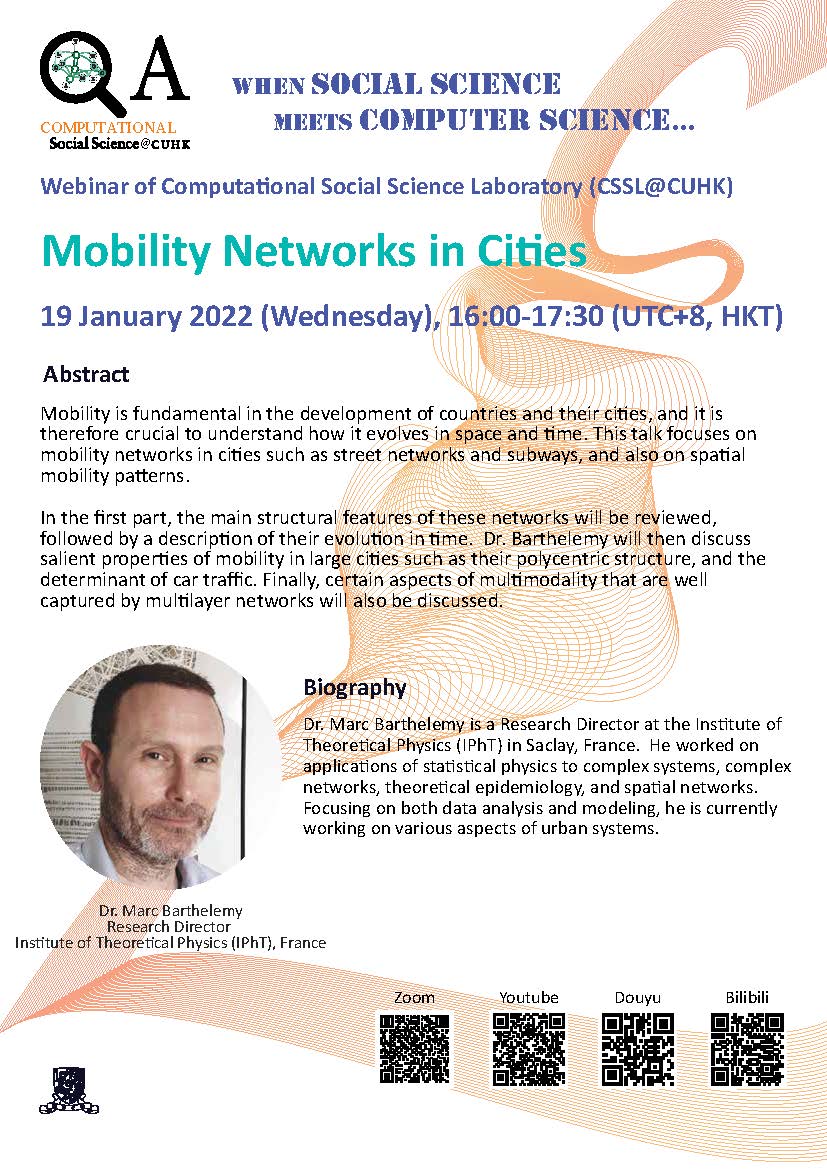
Institute of Theoretical Physics (IPhT), France
Abstract
Mobility is fundamental in the development of countries and their cities, and it is therefore crucial to understand how it evolves in space and time. This talk focuses on mobility networks in cities such as street networks and subways, and also on spatial mobility patterns.
In the first part, the main structural features of these networks will be reviewed, followed by a description of their evolution in time. Dr. Barthelemy will then discuss salient properties of mobility in large cities such as their polycentric structure, and the determinant of car traffic. Finally, certain aspects of multimodality that are well captured by multilayer networks will also be discussed.
Biography
Dr. Marc Barthelemy is a Research Director at the Institute of Theoretical Physics (IPhT) in Saclay, France. He worked on applications of statistical physics to complex systems, complex networks, theoretical epidemiology, and spatial networks.
Focusing on both data analysis and modeling, he is currently working on various aspects of urban systems.
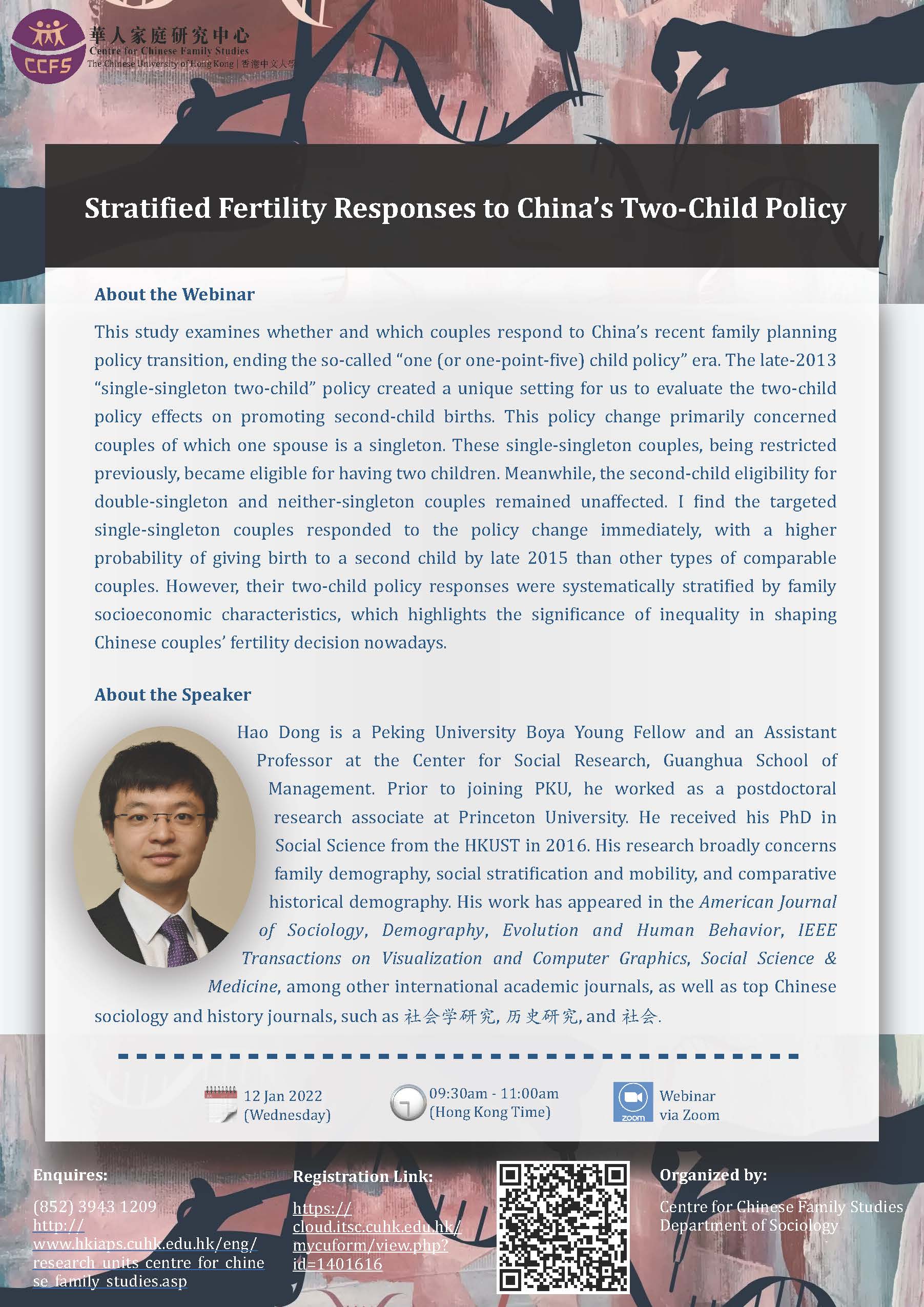
http:// www.hkiaps.cuhk.edu.hk/eng/ research_units_centre_for_chine se_family_studies.asp
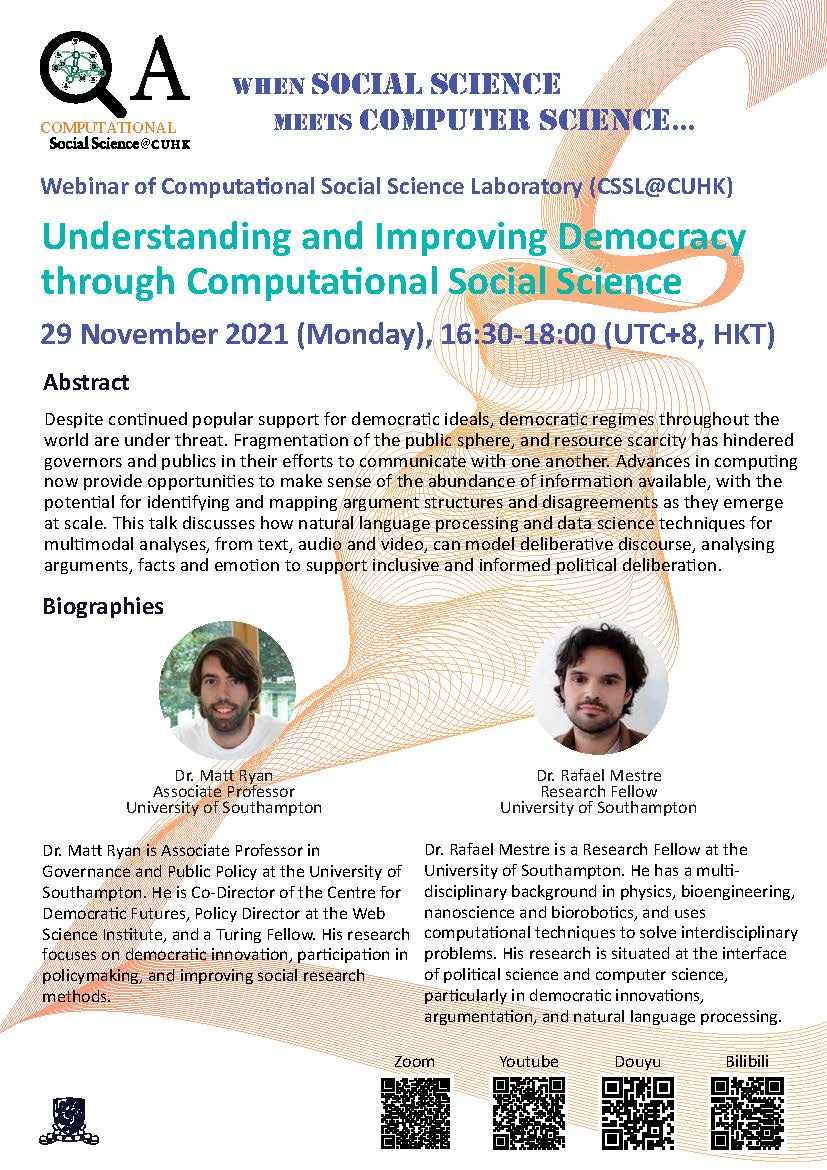
sociology@cuhk.edu.hk
Abstract
Despite continued popular support for democratic ideals, democratic regimes throughout the world are under threat. Fragmentation of the public sphere, and resource scarcity has hindered governors and publics in their efforts to communicate with one another. Advances in computing now provide opportunities to make sense of the abundance of information available, with the potential for identifying and mapping argument structures and disagreements as they emerge at scale. This talk discusses how natural language processing and data science techniques for multimodal analyses, from text, audio and video, can model deliberative discourse, analyzing arguments, facts and emotion to support inclusive and informed political deliberation.
Biographies
Dr. Matt Ryan is Associate Professor in Governance and Public Policy at the University of Southampton. He is Co-Director of the Centre for Democratic Futures, Policy Director at the Web Science Institute, and a Turing Fellow. His research focuses on democratic innovation, participation in policymaking, and improving social research methods.
Dr. Rafael Mestre is a Research Fellow at the University of Southampton. He has a multi- disciplinary background in physics, bioengineering, nanoscience and biorobotics, and uses computational techniques to solve interdisciplinary problems. His research is situated at the interface of political science and computer science, particularly in democratic innovations, argumentation, and natural language processing.

Assistant Professor of Sociology, The Chinese University of Hong Kong
sociology@cuhk.edu.hk
About the Webinar
Girls’ concurrence of higher educational achievement and higher depression levels seems incompatible with the negative correlation between educational achievement and depression. This seeming paradox suggests hidden gender disparities. I propose a framework of Bive correlation patterns to accommodate this seeming incompatibility, with each pattern representing a unique gender disparity structure. To test this framework, I analyze two waves of data from the China Education Panel Survey. The results support a “female-driven, male followed” pattern of correlations, i.e., compared with boys, girls have a stronger, negative correlation between achievement and depression. Moreover, the reciprocal relationship between achievement and depression holds only for girls, not boys, which partially explains girls’ stronger correlation between achievement and depression. For girls, achievement and depression contribute equally to their reciprocal relationship. Finally, the gender disparity in depression is more pronounced among low-achieving students. High-achieving girls do not exhibit higher levels of depression than high-achieving boys, while low-achieving girls exhibit much higher depression levels than low-achieving boys. Such results suggest low-achieving girls are particularly vulnerable to depression. These Bindings have broad theoretical implications, and the framework of Bive correlation patterns can also be adapted to investigate other forms of inequality.
About the Speaker
SHEN Wensong is an Assistant Professor of Sociology at the Chinese University of Hong Kong. His research focuses on education and health, and especially the interaction between education and health in the context of social stratiBication and inequality. Broadly speaking, he utilizes quantitative methods to explore how individuals and families with different social backgrounds experience the complex process of social stratiBication, and how such experiences shape their life opportunities and consequences such as education and health.

Assistant Professor, Faculty of Law, The Chinese University of Hong Kong
genderstudies@cuhk.edu.hk
Language: English
All are welcome. Free admission
This lecture explores the challenges and opportunities of gender constitutionalism in order to explain the extent to which constitutional law and litigation have provided an adequate venue to advance the equality claims of women and sexual and gender diverse people in the Asian context. In particular, the focus on the constitutional framing of sexual and reproductive rights seeks to illuminate questions about the relationship between gender constitutionalism and national identity. A comparative analysis of the constitutional treatment of sexual and reproductive rights in several Asian jurisdictions reveals a spectrum of approaches, which reflect a combination of nationalist, cosmopolitan, and pragmatic responses to demands for change in these areas. This set of questions will be explored in a comparative perspective and through an in depth case-study, that of Nepal — one of the few jurisdictions in the world in which reproductive rights are explicitly enshrined in the text of the constitution.

Professor of Sociology, The Chinese University of Hong Kong
sociology@cuhk.edu.hk
About the Webinar:
The universal two-child policy in China did not lead to a significant increase in fertility. It is important to learn to what extent a couple’s desires for multiple children have an impact on whether they have a second child later on, whether husband dominance exists when couple discrepancy exists, and what factors could reverse the male dominance, if any. In this study, we use the China Family Panel Studies (CFPS) to examine these questions. Findings suggest that the overall rate of having a second child is low after the policy relaxation. Compared to wives, husbands have a greater power on a second child realization, and this phenomenon is more prevalent in rural areas. Female education advantage help reverse the male dominance in such cases. This study sheds light on domestic power relations and second-child realization in an era right after the policy relaxation in China, and calls for policies to target the issues about how to raise fertility level without sacrificing women’s interest.
About the Speaker:
Yuying Tong is a Professor of Sociology at the Chinese University of Hong Kong. She obtained her PhD in Sociology at the University of North Carolina at Chapel Hill (UNC) in 2007. Her research areas crosscut social demography, migration and immigration, family and life course, gender as well as population health/well-being. Her previous work related to these research themes appeared in Social Forces, American Journal of Sociology, Demography, Journal of Marriage and Family, Social Science Research, Social Science & Medicine, European Journal of Population, and other academic journals. She is currently the director of Centre for Chinese Family Studies (CCFS), Hong Kong Institute of Asia-Pacific Studies, and also serves as the Assistant Dean (Research) for Faculty of Social Science at the Chinese University of Hong
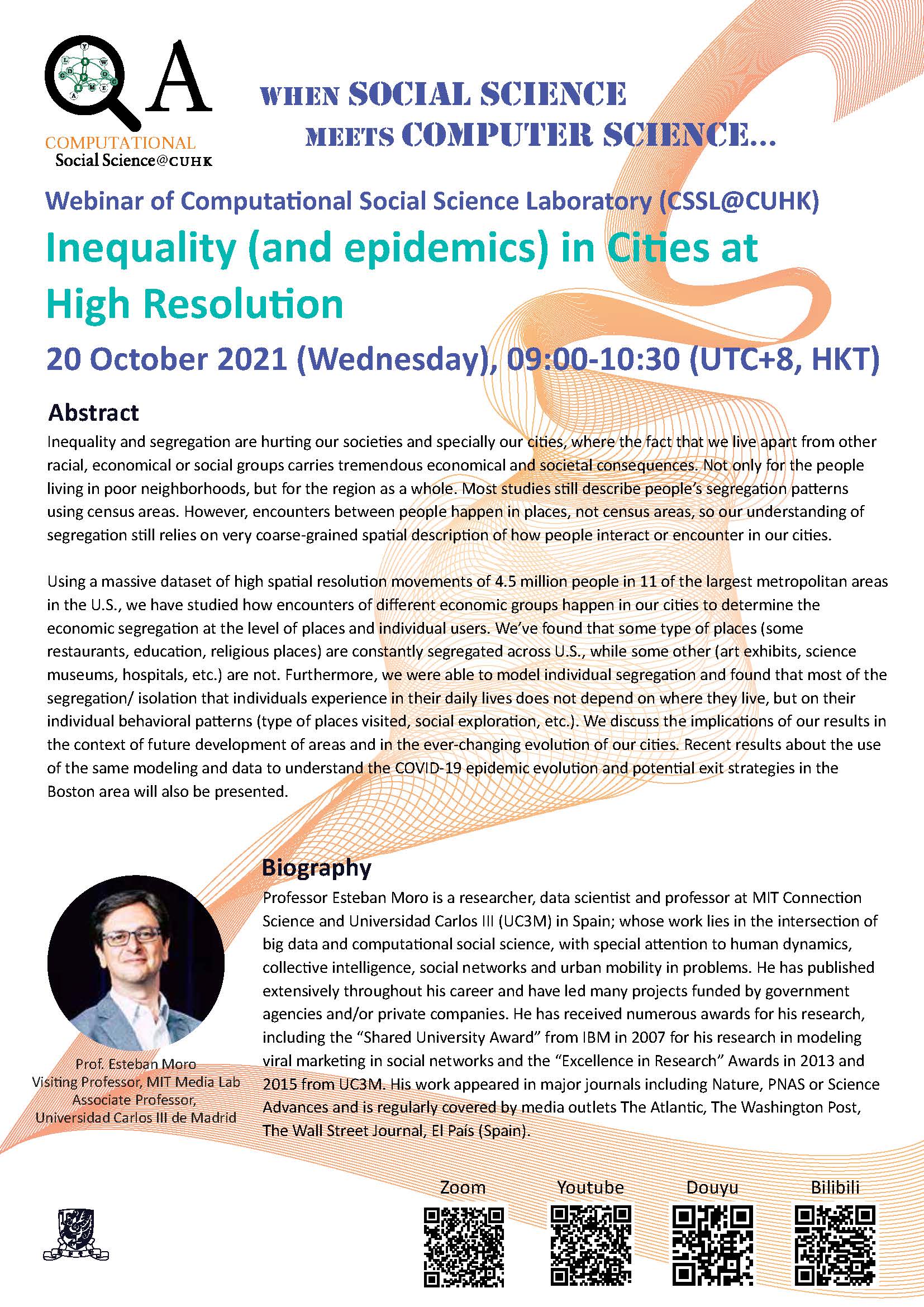
Visiiting Professor, MIT Media Lab
Associate Professor,
Universidad Carlos III de Madrid
Abstract
Inequality and segregation are hurting our societies and specially our cities, where the fact that we live apart from other racial, economical or social groups carries tremendous economical and societal consequences. Not only for the people living in poor neighborhoods, but for the region as a whole. Most studies still describe people’s segregation patterns using census areas. However, encounters between people happen in places, not census areas, so our understanding of segregation still relies on very coarse-grained spatial description of how people interact or encounter in our cities. Using a massive dataset of high spatial resolution movements of 4.5 million people in 11 of the largest metropolitan areas in the US we have studied how encounters of different economic groups happen in our cities to determine the economic segregation at the level of places and individual users. We’ve found that some type of places (some restaurantes, education, religious places) are constantly segregated across US, while some other (art exhibits, science museums, hospitals, etc.) are not. Furthermore, we were able to model individual segregation and found that most of the segregation/isolation that individuals experience in their daily lives does not depend on where they live, but on their individual behavioral patterns (type of places visited, social exploration, etc.) We discuss the implications of our results in the context of future development of areas and in the ever-changing evolution of our cities. I will also present recent results about the use of the same modeling and data to understand the COVID-19 epidemic evolution and potential exit strategies in the Boston area.
Biography
Professor Esteban Moro is a researcher, data scientist and professor at MIT Connection Science and Universidad Carlos III (UC3M) in Spain. He has published extensively throughout his career (more than 100 articles) and have led many projects funded by government agencies and/or private companies. Esteban’s work lies in the intersection of big data and computational social science, with special attention to human dynamics, collective intelligence, social networks and urban mobility in problems like viral marketing, natural disaster management, or economical segregation in cities. He has received numerous awards for his research, including the “Shared University Award” from IBM in 2007 for his research in modeling viral marketing in social networks and the “Excellence in Research” Awards in 2013 and 2015 from UC3M. Esteban work appeared in major journals including Nature, PNAS or Science Advances and is regularly covered by media outlets The Atlantic, The Washington Post, The Wall Street Journal, El País (Spain).

sociology@cuhk.edu.hk
About the Webinar
A growing body of social science research has investigated whether the economic payoff to a college education is heterogeneous — in particular, whether socioeconomically disadvantaged youth can benefit more from attending and completing college relative to their more advantaged peers. Scholars, however, have employed different analytical strategies and reported mixed findings. To shed light on this literature, I propose a sequential approach to conceptualizing, evaluating, and unpacking the causal effects of college on earnings. By decomposing the total effect of attending a four-year college into several direct and indirect components, this approach not only clarifies the mechanisms through which college attendance boosts earnings, but illuminates the ways in which the postsecondary system may be both an equalizer and a disequalizer. The total effect of college attendance, its direct and indirect components, and their heterogeneity by socioeconomic background are all identified under the assumption of sequential ignorability. I introduce a debiased machine learning (DML) method for estimating all quantities of interest, along with a set of bias formulas for sensitivity analysis. I illustrate the proposed framework and methodology using data from the National Longitudinal Survey of Youth, 1997 cohort.
About the Speaker
Xiang Zhou is an associate professor in the Department of Sociology at Harvard University. He is also a faculty affiliate at the Weatherhead Center for International Affairs, Harvard Institute for Quantitative Social Science, Harvard Center for Population and Development Studies, and Fairbank Center for Chinese Studies. His research broadly concerns inequality, education, causal inference, and computational methods. His work has appeared in American Sociological Review, American Journal of Sociology, Social Forces, Journal of Political Economy, Proceedings of the National Academy of Sciences, among other peer-reviewed journals. Before coming to Harvard, Zhou worked as a postdoctoral research associate at Princeton University. He received a PhD in Sociology and Statistics from the University of Michigan in 2015.

sociology@cuhk.edu.hk
ABOUT THE WEBINAR
The ability of parents to devote sufficient time to care work is affected by the temporal conditions of employment. A common assumption in the work-family literature is that workplace flexibility can reduce employment/care time tradeoffs. However, with the increasing bifurcation in the labor market, highly-educated and less-educated workers may have differential experiences of employment hours and job flexibility. We contribute by investigating how a comprehensive set of temporal conditions of work affects parental childcare time, and exploring how these associations vary by the parent’s gender and education. We use nationally representative time diary data from the American Time Use Survey 2017–2018 Leave and Job Flexibilities Module. Temporal dimensions of work include work hours, access to leave, flexible start/end time, short advance notice, types of work shift, and usual days worked. We find that temporal dimensions of paid work are associated with parental childcare time, albeit in gendered ways. In addition, temporal dimensions of job quality widen the educational gradient in mothers’ primary (especially developmental) childcare time. Nevertheless, two temporal aspects of employment seem to narrow the education gradient in fathers’ childcare time, especially routine childcare time. We conclude by discussing the implications of the findings for gender inequality in work and family as well as socioeconomic disparities in child well-being.
ABOUT THE SPEAKER
Yue Qian is an Associate Professor of Sociology at the University of British Columbia. Her research focuses on social demography, family and work, gender, and health. She has conducted research on North America and East Asia (China in particular). Her research has appeared in the American Sociological Review, Social Forces, Journal of Marriage and Family, and Gender & Society.

sociology@cuhk.edu.hk
About the Webinar
The active response to population aging has recently become a top policy in China; however, how to address the rapid population aging in China especially its significant socioeconomic implications is still calling for more research. We argue that an active response to population aging demands re-configurations of current social policies through penetration and permeation of the perspective of population aging. We examine two major public polices, rural development and toilet revolution, to test this argument. Through simulation-based projection and survey data, we illustrate the huge potential of Introducing the perspective of population to expand the scope and content of policies of rural vitalization and toilet revolution in China.
About the Speaker
Dr. Feng Qiushi received his degree from Duke University and is currently Associate Professor at the Department of Sociology, National University of Singapore (NUS). He is the Deputy Director of the Centre for Family and Population Research (CFPR) in NUS. His research fields include aging and health, population studies, and economic sociology. His papers were published in major academic journals, such as the Lancet, American Journal of Public Health, and Journal of Gerontology: Social Sciences. He is Associate Editor of Asian Population Studies, and Co-editor of the book series of Advance in Studies of Aging and Health. He serves on the editorial board for Journal of Gerontology: Social Sciences, Journal of Aging and Health, Research on Aging, and Aging and Health Research. His research has been funded by the United Nations Population Fund (UNPF), Singapore Ministry of Education (MOE), and Singapore National Medical Research Council (NMRC), and NUS Global Asia Institute (GAI).
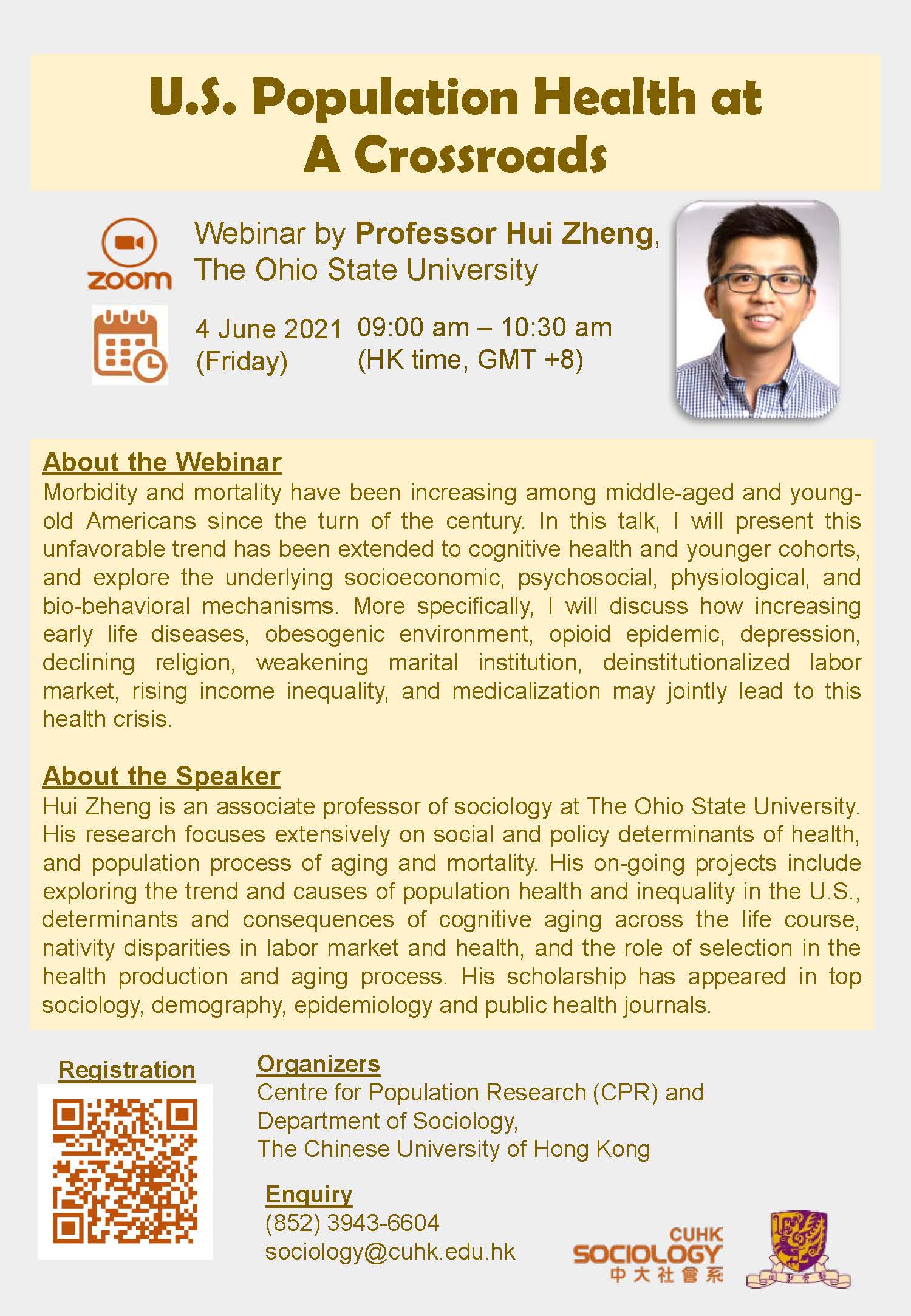
sociology@cuhk.edu.hk
About the Webinar
Morbidity and mortality have been increasing among middle-aged and young-old Americans since the turn of the century. In this talk, I will present this unfavorable trend has been extended to cognitive health and younger cohorts, and explore the underlying socioeconomic, psychosocial, physiological, and bio-behavioral mechanisms. More specifically, I will discuss how increasing early life diseases, obesogenic environment, opioid epidemic, depression, declining religion, weakening marital institution, deinstitutionalized labor market, rising income inequality, and medicalization may jointly lead to this health crisis.
About the Speaker
Hui Zheng is an associate professor of sociology at The Ohio State University. His research focuses extensively on social and policy determinants of health, and population process of aging and mortality. His on-going projects include exploring the trend and causes of population health and inequality in the U.S., determinants and consequences of cognitive aging across the life course, nativity disparities in labor market and health, and the role of selection in the health production and aging process. His scholarship has appeared in top sociology, demography, epidemiology and public health journals.

sociology@cuhk.edu.hk
About the Webinar
During the last decades of the 20th century, the United States underwent a quite encompassing gender revolution, perhaps most notably in the form of a spectacular decline in occupational segregation. But this decline suddenly stalled out in the 21st century. We show that a resurgence in segregation-inducing forms of intergenerational transmission lies behind this development. Far from serving as “impartial conduits,” fathers are disproportionately conveying their male-typed occupations to their sons, a segregative development that accounts for a sizable share of the stalling-out in the trend. This result demonstrates the potential of melding two types of models – segregation and mobility models – that have surprisingly developed quite independently of one another.
About the Speaker
David B. Grusky is Edward Ames Edmonds Professor in the School of Humanities and Sciences, Professor of Sociology, Senior Fellow at the Stanford Institute for Economic Policy Research, Faculty Fellow at the Center for Population Health Sciences, Director of the Stanford Center on Poverty and Inequality, coeditor of Pathways Magazine, and member of the American Academy of Arts and Sciences. His research addresses such topics as the future of extreme inequality in the United States, recent trends in social mobility, new approaches to reducing poverty and increasing mobility, and new ways to uncover “poverty crises” in the making before it’s too late.

sociology@cuhk.edu.hk
About the Webinar:
We examine the linkage between religious involvement and life satisfaction among adults in contemporary China, a largely non-religious society. Using data from the China Family Panel Studies (2012, 2014 and 2016), we conduct latent class analysis by using four indicators of religious involvement, including membership of religious groups, types of religion, frequency of participation, and evaluation of the importance of religion in life. We classify the sample into four latent classes: (a) the pure non-religious, (b) the non-religious, but with some spirituality, (c) Chinese religion adherent, and (d) organized religion adherent. Results from our fixed-effect models show that Chinese-religion and organized-religion adherents have higher levels of life satisfaction than those with no religious beliefs. Moreover, the disadvantaged groups benefit more from religious involvement in China, as evidenced by the stronger positive effect of religious adherence found among rural residents and individuals in the lowest income quartile. We discuss the benefits of religion both in terms of its public/social and private/intrinsic aspects and situate our findings in the larger social context of China.
About the Speaker:
Feinian Chen is Professor of Sociology and a faculty associate at the Maryland Population Research Center at the University of Maryland. She received her PhD in sociology from the University of North Carolina at Chapel Hill in 2001 and was trained in social demography at the Carolina Population Center. Her research crosscuts a range of areas in demography, family sociology, gender, aging, and quantitative methodology. Her main research interests include women’s work and family, intergenerational relations, population aging and health. Her work has been published in the American Sociological Review, Social Forces, Demography, Journal of Gerontology: Social Sciences, Journal of Health and Social Behavior, Journal of Marriage and Family, and Sociological Methods and Research. Her work has been funded by the National Institutes of Health and the Hewlett Foundation. She is actively engaged in research in family transitions, gender dynamics, and their health implications in the diverse contexts of China, India, the Philippines, and the U.S.
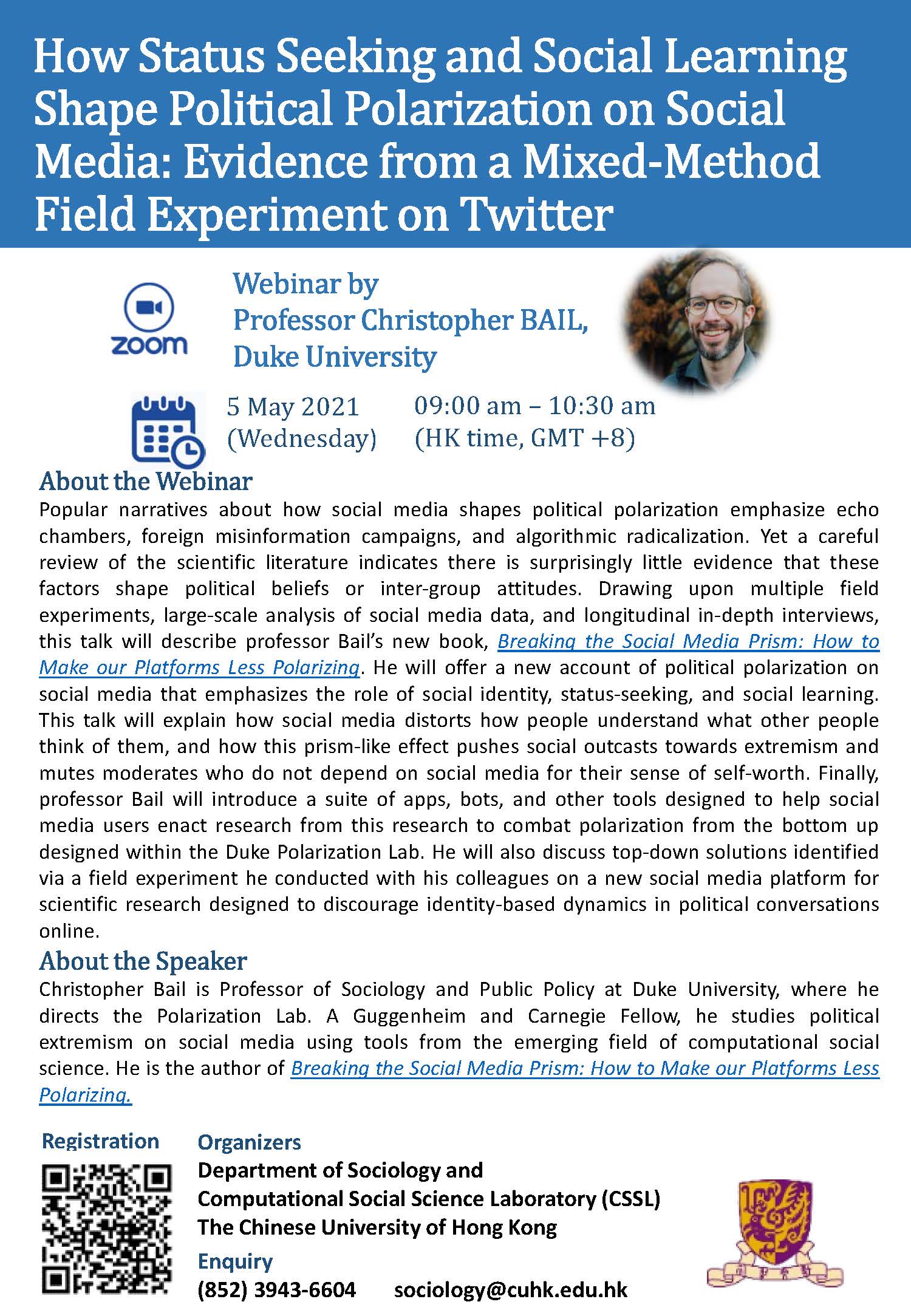
sociology@cuhk.edu.hk
About the Webinar:
Popular narratives about how social media shapes political polarization emphasize echo chambers, foreign misinformation campaigns, and algorithmic radicalization. Yet a careful review of the scientific literature indicates there is surprisingly little evidence that these factors shape political beliefs or inter-group attitudes. Drawing upon multiple field experiments, large-scale analysis of social media data, and longitudinal in-depth interviews, this talk will describe professor Bail’s new book, Breaking the Social Media Prism: How to Make our Platforms Less Polarizing. He will offer a new account of political polarization on social media that emphasizes the role of social identity, status-seeking, and social learning. This talk will explain how social media distorts how people understand what other people think of them, and how this prism-like effect pushes social outcasts towards extremism and mutes moderates who do not depend on social media for their sense of self-worth. Finally, professor Bail will introduce a suite of apps, bots, and other tools designed to help social media users enact research from this research to combat polarization from the bottom up designed within the Duke Polarization Lab. He will also discuss top-down solutions identified via a field experiment he conducted with his colleagues on a new social media platform for scientific research designed to discourage identity-based dynamics in political conversations online.
About the Speaker:
Christopher Bail is Professor of Sociology and Public Policy at Duke University, where he directs the Polarization Lab. A Guggenheim and Carnegie Fellow, he studies political extremism on social media using tools from the emerging field of computational social science. He is the author of Breaking the Social Media Prism: How to Make our Platforms Less Polarizing.

sociology@cuhk.edu.hk
About the Webinar:
The study explores the gendered effects of family care responsibilities on employment outcomes of job candidates in Hong Kong, in the frameworks of market meritocracy and family moral virtuocracy. The authors adopt a mixed-methods research design, which includes a CV-based survey (n=102), 20 in-depth interviews, and one focus group session of 9 participants with various employers in Hong Kong. The results show that fathers and caregivers of ageing parents receive favorable evaluations and treatments in the combining power of market meritocracy and moral virtuocracy; mothers are evaluated as possessing market merits but are not favored in job offers. Sub-group analyses and qualitative data further demonstrate that market meritocracy fails to function for virtuous female caregivers in employment opportunities, largely due to structural and cultural barriers in the labor market, instead of stereotypes as often believed. This fundamental inequality needs to be addressed with policy interventions.
About the Speaker:
Haijing Dai is an associate professor at the Department of Social Work of the Chinese University of Hong Kong. She received her PhD in social work and sociology from the University of Michigan, Ann Arbor. Her main research interests include comparative social welfare development, grassroots community organizing, gender and employment, and social change in contemporary China.
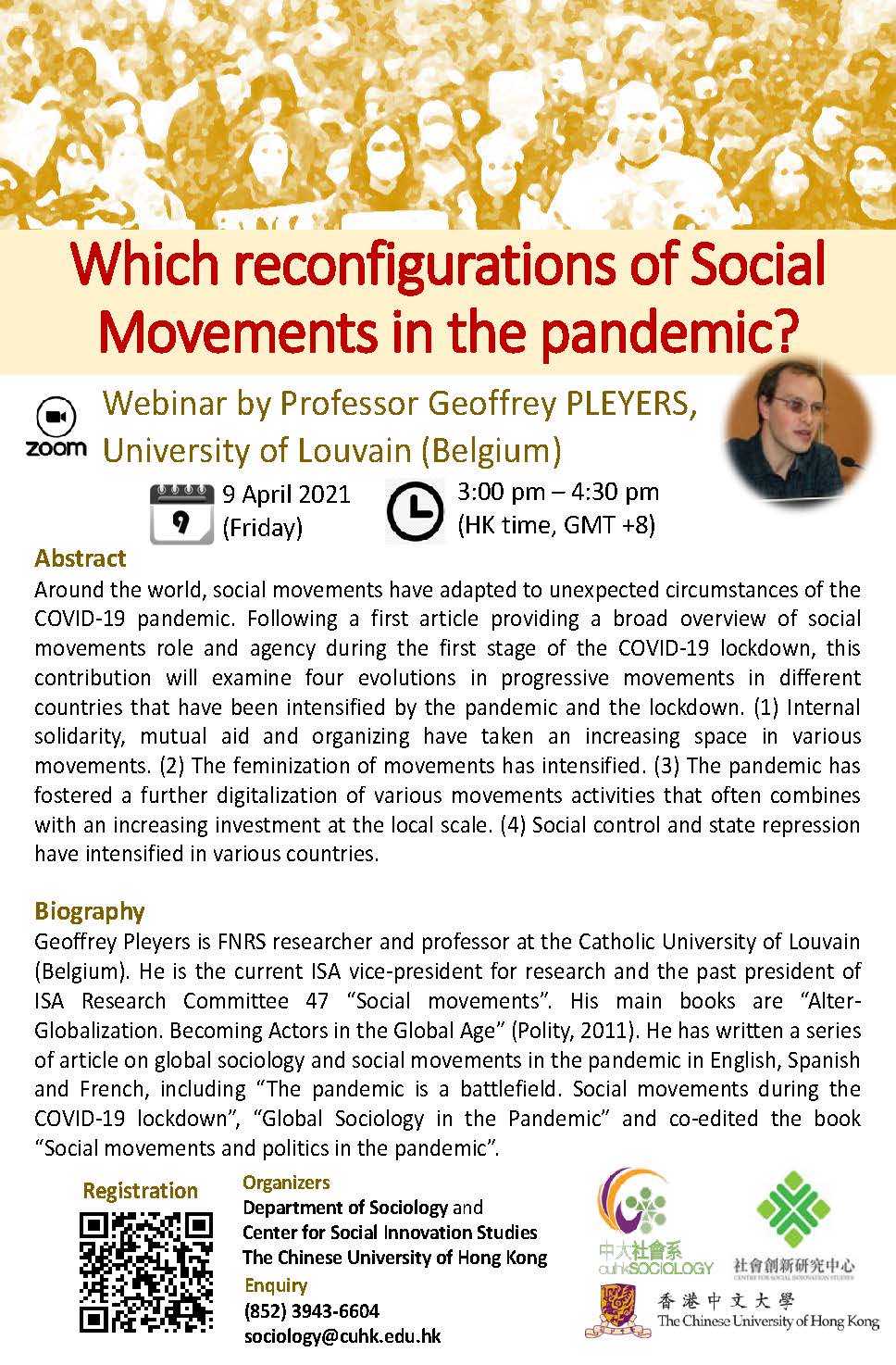
(ZOOM Link will be sent to registered audience after finished the e-registration.)
sociology@cuhk.edu.hk
About the Webinar:
Around the world, social movements have adapted to unexpected circumstances of the COVID-19 pandemic. Following a first article providing a broad overview of social movements role and agency during the first stage of the COVID-19 lockdown, this contribution will examine four evolutions in progressive movements in different countries that have been intensified by the pandemic and the lockdown. (1) Internal solidarity, mutual aid and organizing have taken an increasing space in various movements. (2) The feminization of movements has intensified. (3) The pandemic has fostered a further digitalization of various movements activities that often combines with an increasing investment at the local scale. (4) Social control and state repression have intensified in various countries.
About the Speaker:
Geoffrey Pleyers is FNRS researcher and professor at the Catholic University of Louvain(Belgium). He is the current ISA vice-president for research and the past president of ISA Research Committee 47 “Social movements”. His main books are “Alter-Globalization. Becoming Actors in the Global Age” (Polity, 2011). He has written a series of article on global sociology and social movements in the pandemic in English, Spanish and French, including “The pandemic is a battlefield. Social movements during the COVID-19 lockdown”, “Global Sociology in the Pandemic” and co-edited the book “Social movements and politics in the pandemic”.

(ZOOM Link will be sent to registered audience after finished the e-registration.)
sociology@cuhk.edu.hk
About the Webinar
Global trends of fertility decline, population aging, and rural outmigration are creating pressures to consolidate school systems, with the rationale that economies of scale will enable higher quality education to be delivered in an efficient manner, despite longer travel distances for students. Yet, few studies have considered the implications of system consolidation for educational access and inequality, outside of the context of developed countries. This talk will consider the impact of educational infrastructure consolidation on educational attainment using the case of China’s rural primary school closure policies in the early 2000s. The talk will share findings related to gender and ethnic disparities in the implications of consolidation for educational attainment.
About the Speaker
Emily Hannum is Professor of Sociology and Associate Dean for Social Sciences in the School of Arts and Sciences at the University of Pennsylvania. Her research interests are poverty and child welfare, gender and ethnic stratification, and sociology of education. Current projects in China include studies of childhood poverty and inequality, environmental inequality and infant and child welfare, and the impact of large-scale school consolidations on educational attainment. She is also working on comparative analyses of school performance, with attention to disparities associated with family separation, family background, and gender. Recent publications include “Education in East Asian Societies: Postwar Expansion and the Evolution of Inequality” (2019, Annual Review of Sociology, with Hiroshi Ishida, Hyunjoon Park, and Tony Tam); “Differences at the Extremes? Gender, National Contexts, and Math Performance in Latin America” (2020, American Educational Research Journal, with Ran Liu and Andrea Alvarado-Urbina); and “Estimating the Effects of Educational System Consolidation: The Case of China’s Rural School Closure Initiative” (forthcoming, Economic Development and Cultural Change, with Xiaoying Liu and Fan Wang).
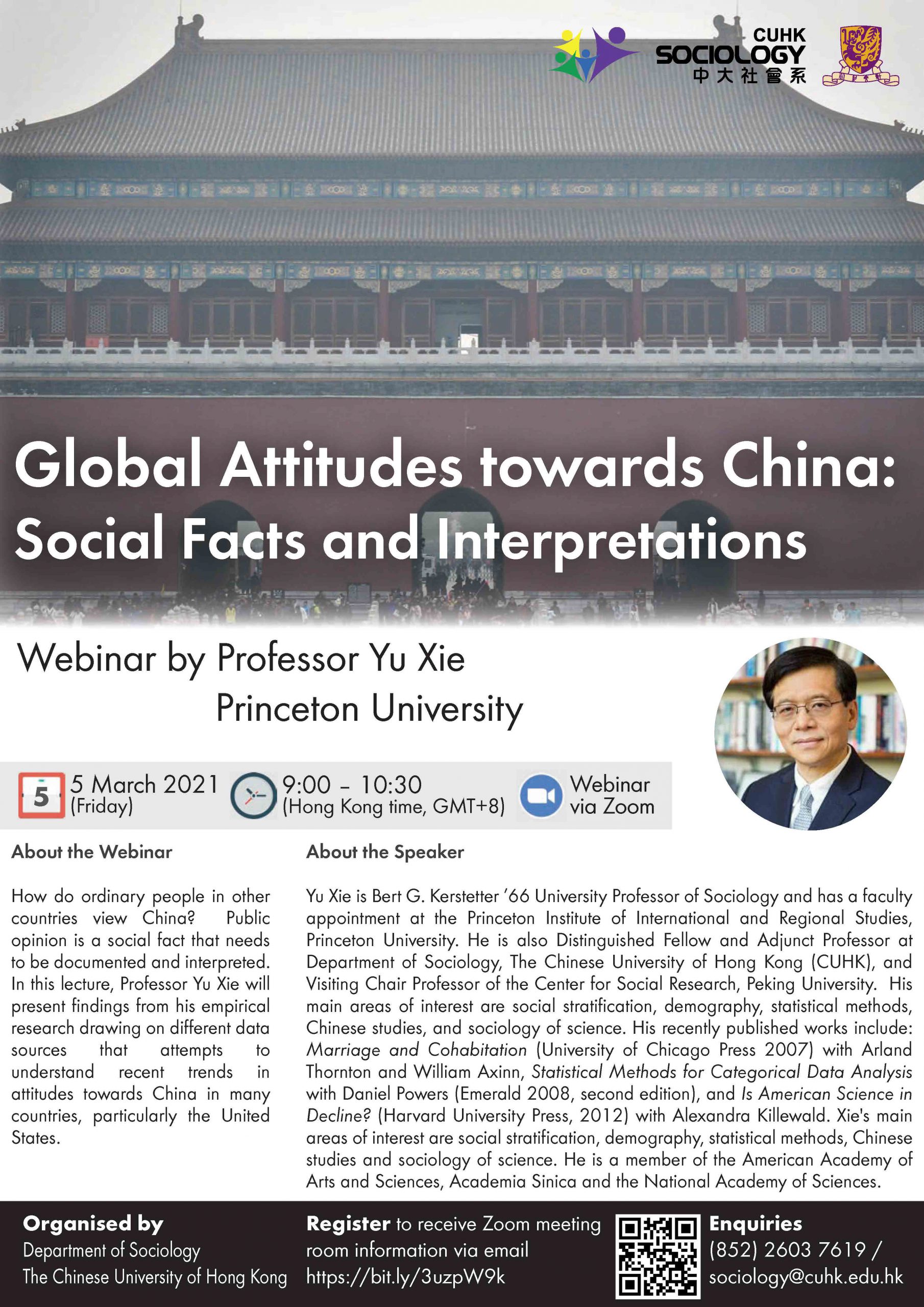
(ZOOM Link will be sent to registered audience after finished the e-registration.)
sociology@cuhk.edu.hk
About the Webinar
How do ordinary people in other countries view China? Public opinion is a social fact that needs to be documented and interpreted. In this lecture, Professor Yu Xie will present findings from his empirical research drawing on different data sources that attempts to understand recent trends in attitudes towards China in many countries, particularly the United States.
About the Speaker
Yu Xie is Bert G. Kerstetter ’66 University Professor of Sociology and has a faculty appointment at the Princeton Institute of International and Regional Studies, Princeton University. He is also Distinguished Fellow and Adjunct Professor at Department of Sociology, The Chinese University of Hong Kong (CUHK), and Visiting Chair Professor of the Center for Social Research, Peking University. His main areas of interest are social stratification, demography, statistical methods, Chinese studies, and sociology of science. His recently published works include: Marriage and Cohabitation (University of Chicago Press 2007) with Arland Thornton and William Axinn, Statistical Methods for Categorical Data Analysis with Daniel Powers (Emerald 2008, second edition), and Is American Science in Decline? (Harvard University Press, 2012) with Alexandra Killewald. Xie’s main areas of interest are social stratification, demography, statistical methods, Chinese studies and sociology of science. He is a member of the American Academy of Arts and Sciences, Academia Sinica and the National Academy of Sciences.

(ZOOM Link will be sent to registered audience after finished the e-registration.)
sociology@cuhk.edu.hk
About the Webinar
We are continually surprised that waves of collective protest take us by surprise. In 2020, the killing of one man in Minnesota mobilized half a million Americans to take to the streets on a single day. How have sociologists of social movements explained these upsurges of protest? What regularities can be discerned across different movements and varied political contexts? How does these regularities illuminate the social mechanisms underlying protest? My talk will draw on various historical episodes, from riots in the early 19th century to the protests following the death of George Floyd.
About the Speaker
Professor Michael Biggs is Associate Professor of Sociology at the University of Oxford and Fellow of St Cross. His research on social movements addresses two different themes: the volatility of protest waves and self-inflicted suffering as protest. He has published in American Journal of Sociology, American Sociological Review, British Journal of Sociology, Social Forces, European Sociological Review, Politics and Society, and Mobilization.

Provost’s Chair Professor
Department of Sociology
National University of Singapore
(ZOOM Link will be sent to registered audience after finished the e-registration.)
sociology@cuhk.edu.hk
Abstract of the talk
The rise in on-person household (OPH) is exerting a powerful influence on many aspects of modern lives. In this seminar, the speaker will show the prevalence and characteristics of those who will live alone in China in the next three decades based on the projections using the ProFamy Extended Cohort-component Method. Distinct from traditional household projection methods, ProFamy is an individual- based macro-simulation method, which simulates the changes of households based on individuals grouped by age, sex, race, marital/union status, parity, and number of co-residing children/parents, rural/urban residence. Results show that OPH will more than double from 2010 to 2050, to hit about 133 million in China by 2050. Approximately one in four Chinese households will have only one resident. The most rapid growth will be among the oldest-olds and the largest solo-living subgroup will be the unmarried urban youth, many of whom are highly educated.
About the speaker
Wei-Jun Jean Yeung is Provost’s Chair Professor of Sociology and Founding Director of the Centre for Family and Population Research at the National University of Singapore. She is a council member of the Asian Population Association and of the International Sociological Association’s Research Committee on Family. She has published extensively in leading journals on population, family, and social inequality and received many prestigious awards. Her recent research includes those that examine the global family changes, productive aging, youth labor markets, migration, marriage, and children’s well-being in Asia.

sociology@cuhk.edu.hk
Abstract of the talk
As a reflection of social norms towards childbearing, the ideal number of children is crucial to project the long-term fertility trend. Comparing China and other selected countries, our results show that the average ideal family size is much lower among Chinese women aged between 18 and 49. We also observe high one-child and low 3-or-more-children intentions in China. Capitalizing on the 2018 China Family Panel Study, we examine the effects of macro-level contextual factors on the ideal number of children in China. Results show that the higher economic development level, higher income inequality level, lower total fertility rate, and higher educational competition level will lead to smaller ideal family size. The mediation analysis shows that contextual fertility level and educational pressure are more important in shaping Chinese people’s ideal family size. Our study implies that fertility attitudes should be understood by taking the historical, cultural, and social context into account.
About the speaker
Jia Yu is an assistant professor of Center for Social Research at Peking University in Beijing, China. Her research interest lies in marriage and family, gender inequality, and social stratification in China. Her work about family and gender in China has appeared in journals such as Demography, Population and Development Review, Journal of Marriage and Family, and Chinese Sociological Review.
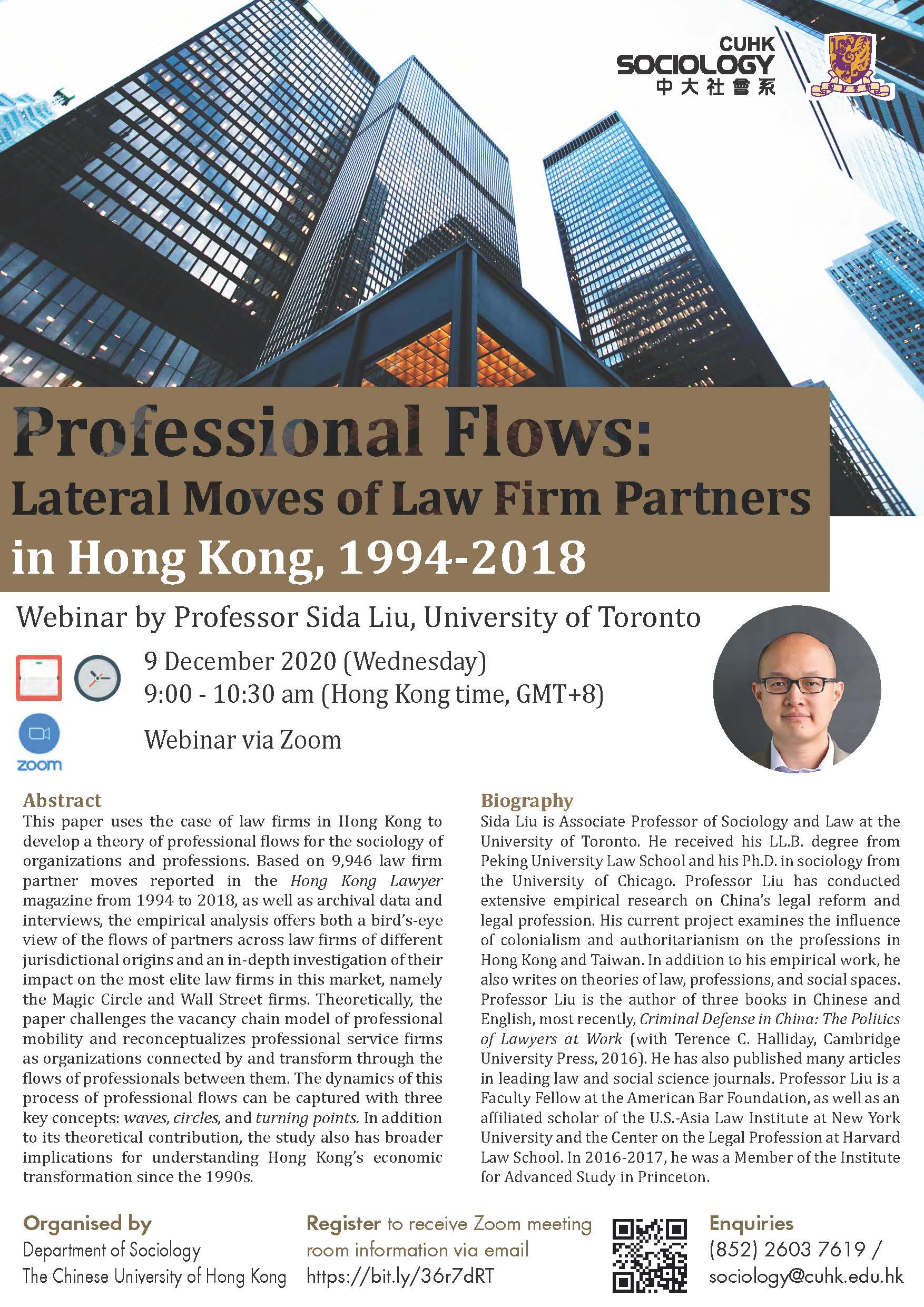
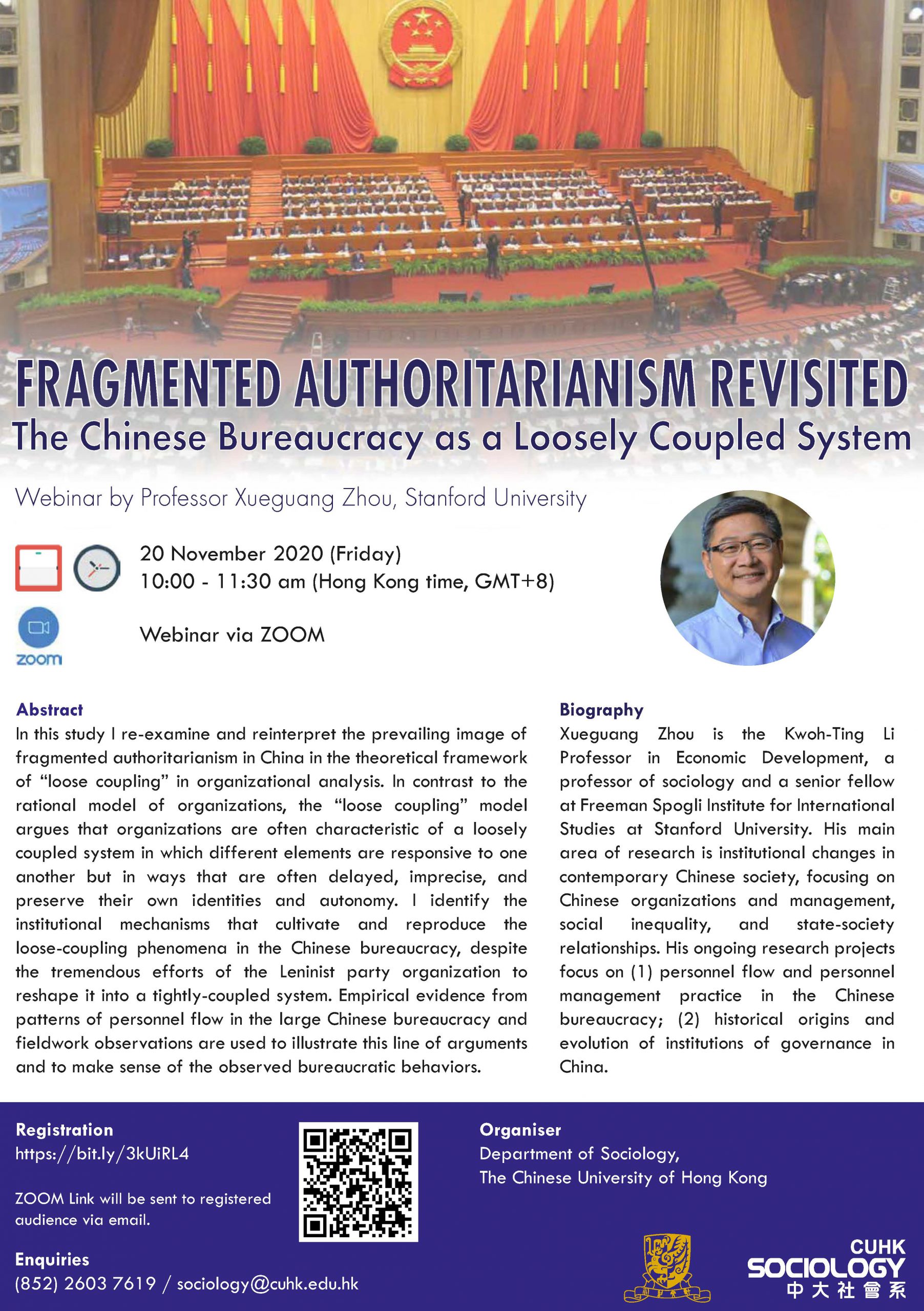
sociology@cuhk.edu.hk
Abstract
In this study I re-examine and reinterpret the prevailing image of fragmented authoritarianism in China in the theoretical framework of “loose coupling” in organizational analysis. In contrast to the rational model of organizations, the “loose coupling” model argues that organizations are often characteristic of a loosely coupled system in which different elements are responsive to one another but in ways that are often delayed, imprecise, and preserve their own identities and autonomy. I identify the institutional mechanisms that cultivate and reproduce the loose-coupling phenomena in the Chinese bureaucracy, despite the tremendous efforts of the Leninist party organization to reshape it into a tightly-coupled system. Empirical evidence from patterns of personnel flow in the large Chinese bureaucracy and fieldwork observations are used to illustrate this line of arguments and to make sense of the observed bureaucratic behaviors.
Biography
Xueguang Zhou is the Kwoh-Ting Li Professor in Economic Development, a professor of sociology and a senior fellow at Freeman Spogli Institute for International Studies at Stanford University. His main area of research is institutional changes in contemporary Chinese society, focusing on Chinese organizations and management, social inequality, and state-society relationships. His ongoing research projects focus on (1) personnel flow and personnel management practice in the Chinese bureaucracy; (2) historical origins and evolution of institutions of governance in China.

chendan893@gmail.com
Abstract of the talk
Following the end of the one-child-policy in China in 2016 and the gradual relaxation of only-one child per family in selected areas prior to that, family composition and relationship dynamics, specially siblings relationship within the Chinese familial context has gone through a rapid growth and some significant changes as a result of the introduction of the two-child policy. This policy hange, leading to the possibility of adding another child into the family may have profound implications on the family system, its functioning and care relations among those living in China.
This presentation will review empirical findings to answer two questions: How do Chinese parents raise two children within a family? Does parents’ own sibling status matter?
About the speaker
Bin-Bin Chen, PhD, is an Associate Professor at Department of Psychology, Fudan University, China. His research interests include various aspects of family relationships and the social and motional development of child and adolescent. He is also the Principal Investigator of the Fudan Sibling Project (FSP), a longitudinal investigation exploring changes in family functioning and the firstborn’s adjustment after the birth of a second child, which has received funding from the National Natural Science Foundation of China. He has publications in journals such as Developmental Psychology, Development and Psychopathology, Journal of Research on Adolescence, and Child Development Perspectives. He was the 2017 recipient of Chinese Young Scholar Award, The 10th Conference for Chinese Psychologist.

Assistant Professor, Arizona State University
sociology@cuhk.edu.hk
Abstract of the talk
Background: Although welfare programs in China provide a safety net for low-income people by directly lifting their incomes, receiving benefits has the potential to affect recipients’ mental health because of the demanding and demeaning means-testing application process required by Chinese policy makers. However, little research has
examined the relationship between welfare participation and mental health symptoms-particularly those of depression-among Chinese youth. This study aims to examine the relationship between family participation in the Dibao income-assistance program in China and symptoms of depression among youth.
Methods: This study used a youth sample (n=4,192) of nationally representative data from the China Family Panel Studies (CFPS) survey. Multiple imputation was used to deal with missing data. Propensity score matching based on the imputed datasets was used to reduce the selection bias of the two groups (Dibao recipients vs non-Dibao). The imputed data was analyzed using aggregated robust multiple regression. The Center for Epidemiological Studies depression scale (CESD-20) was used to measure depression symptoms. In addition, a variety of subgroup analyses were conducted to explore whether the relationship between Dibao participation and symptoms of depression differs significantly by the sociodemographic characteristics.
Results: Youth whose families received Dibao assistance had significantly greater risk for symptoms of depression compared to peers who did not receive assistance. Results also showed that young women- especially young mothers-whose families participated in the Dibao program in rural areas were at significantly higher risk compared to others.
Conclusion and Discussion: The relationship between welfare participation and symptoms of depression varies significantly by the characteristics of youths and their families. As a marker for collective disadvantage and adversity, welfare participation warrants research to study program processes and to distinguish pathways-possibly differentiated by gender-that may elevate risk for depression among Dibao program recipients.
About the speaker
Dr. Shiyou Wu is an Assistant Professor at the School of Social Work at Arizona State University. Wu has been involved in interdisciplinary collaborative research locally, nationally, and internationally, using a social determinants of health framework and a person-in-environment perspective to explore the multi-level (individual, interpersonal, household, community, societal) determinants of youth behavioral health outcomes, especially among youth from impoverished families (e.g., welfare recipients).

The University of Oklahoma.
sociology@cuhk.edu.hk
Abstract
Using data from the 2000 and 2009 National Surveys of Family and Economic Conditions in Japan, (N = 2,202) we examine the relationship between knowing someone engaged in “innovative” family behaviors and attitudes toward such behaviors. We extend existing research on this topic in three ways: 1) by adding a longitudinal component that allows us to estimate a fixed-effects model that controls out the influence of unmeasured, time-invariant factors likely to be related to both knowing and attitudes, 2) examining whether know behaviors themselves, or relationship domains, are the more salient predictor of attitudes, and 3) by focusing more explicitly on gender differences. We find that, net of unmeasured time-invariant characteristics, knowing a friend or co-worker who engaged in innovative family behaviors is associated with a significant change toward more non-traditional attitudes, and more so for women than for men.
Biography
Martin Piotrowski is an Associate Professor of Sociology at the University of Oklahoma. He received his PhD in sociology from the University of North Carolina at Chapel Hill in 2006 and was trained at the Carolina Population Center (CPC). He is a demographer specializing in quantitative methods and conducts research on aspects of rural-to-urban migration, marriage and fertility, and familial and gender attitudes especially in parts of Asia. He has done research in countries experiencing large-scale socioeconomic change including Thailand, Nepal, China, and Japan and has explored topics involving inter-generational and family relations, household structures, and life course transitions. He has published widely in sociology, family, and demography journals including Social Science Research, Journal of Marriage and Family, Population Studies, European Journal of Population, and others.

Assistant Professor At The University Of California, Los Angeles
Rachel Rinaldo
Associate Professor At The University Of Colorado Boulder
fjolivos@link.cuhk.edu.hk
Jeffrey Guhin Assistant Professor at The University Of California, Los Angeles Rachel Rinaldo Associate Professor at The University Of Colorado Boulder September 25, 2020 (Friday) 11:00am HKT Via Zoom For Research Postgraduate Students (Mphil/Phd) Of Our Department Contact us at fjolivos@link.cuhk.edu.hk Or kelvinlam@link.cuhk.edu.hk if you are interested to join the seminar. We look forward to meeting you.

Associate Professor of Department of Social and Behavioural Sciences
City University of Hong Kong

Xueguang Zhou is Professor of Sociology and Kwoh-Ting Li Professor in Economic Development and FSI Senior Fellow at Stanford University. His main area of research is institutional changes in contemporary Chinese society, focusing on Chinese organizations and management, social inequality, and state-society relationships.
Organizational approaches to social phenomena have become a major research paradigm since the 1980s, partly because the field of organizational research has matured, with rich theoretical models and analytical tools accumulated, and partly because contemporary society has become increasingly structured by formal organizations and are hence subject to organizational analysis.
This workshop introduces organizational approaches to selected, substantive areas of sociological inquiry. The goal of this workshop is to focus on some classical ideas in the literature and introduce the kind of research issues, theoretical models, and analytical concepts in organizational research and their applications in selected areas.
Sessions
1.Seminar 1. Organizational approaches: An overview. August 10, 9am – 12pm HK
2.Seminar 2. Organizational approaches to state building & bureaucracy. August 12, 9am – 12pm HKT
3.Seminar 3. Organizational approach to stratification & inequality. August 14, 9am – 12pm HKT.
4.Seminar 4. Organizational approach to social movements. August 17, 9am – 12pm HKT
Practical Sessions. Before 4 September 2020, exact dates yet to be confirmed.
1.Project preparation and consultation
2.Project presentation and discussion
Eligibility
RPg students of Department of Sociology, CUHK

Department of Educational Policy Studies, University of Wisconsin-Madison

School of Sociology and Population Studies, Renmin University of China

Yale University

Hong Kong Baptist University

Sociology at National Taiwan University
sociology@cuhk.edu.hk

Science and Technology Studies at Linköping University and Emeritus Professor of Marketing at the University of Oxford
sociology@cuhk.edu.hk

Department of Sociology, the University of British Columbia
rcmm@cuhk.edu.hk

南京大學社會學院
rcmm@cuhk.edu.hk

Hong Kong Baptist University
sociology@cuhk.edu.hk

Cornerstone Faculty Fellow Professor of Sociology at Texas A&M University in College Station, Texas
rcmm@cuhk.edu.hk
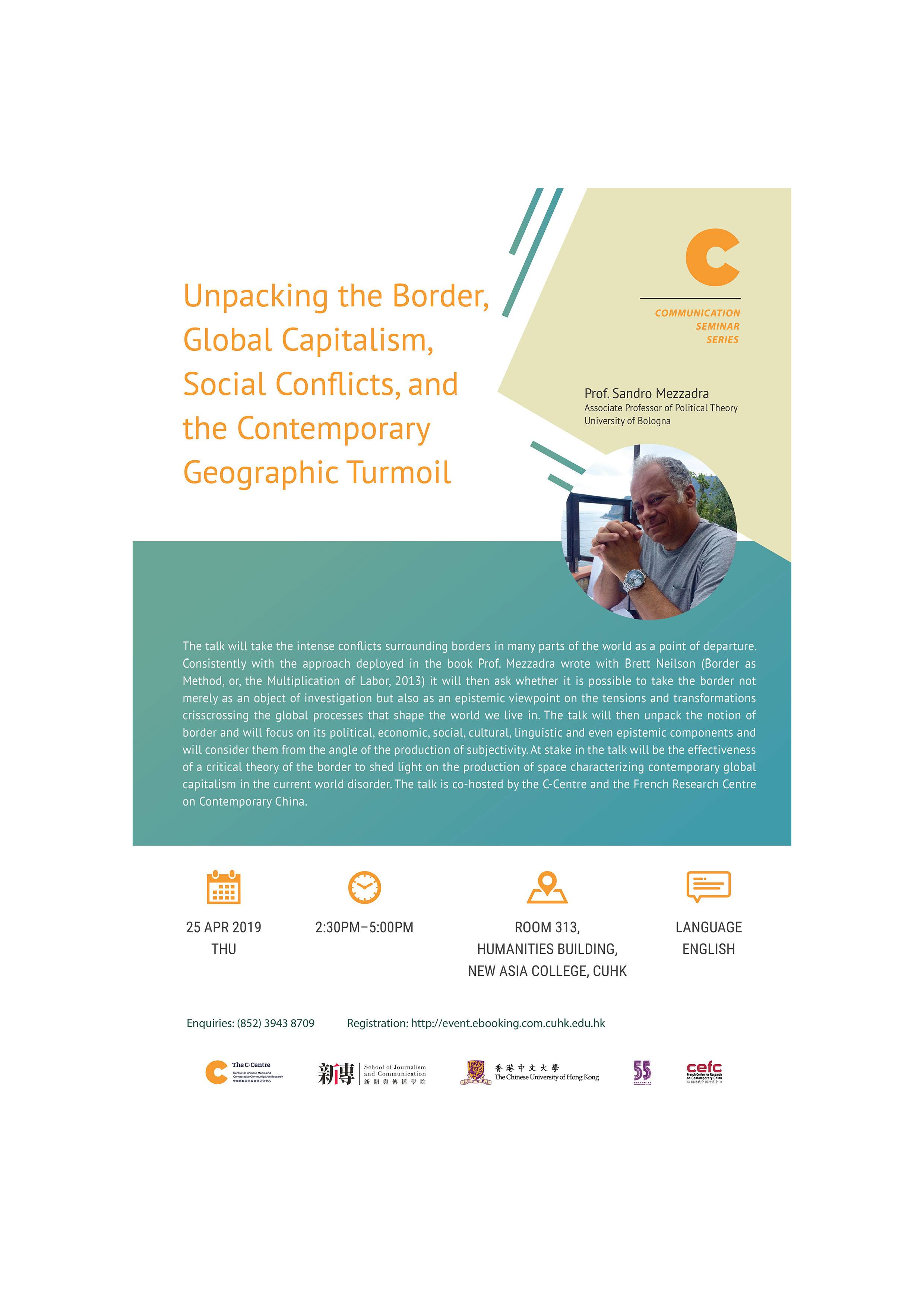
Political Theory, University of Bologna

Dept of Geography, National Taiwan University
rcmm@cuhk.edu.hk

Department of Sociology, Yonsei University
rcmm@cuhk.edu.hk

Princeton University
sociology@cuhk.edu.hk
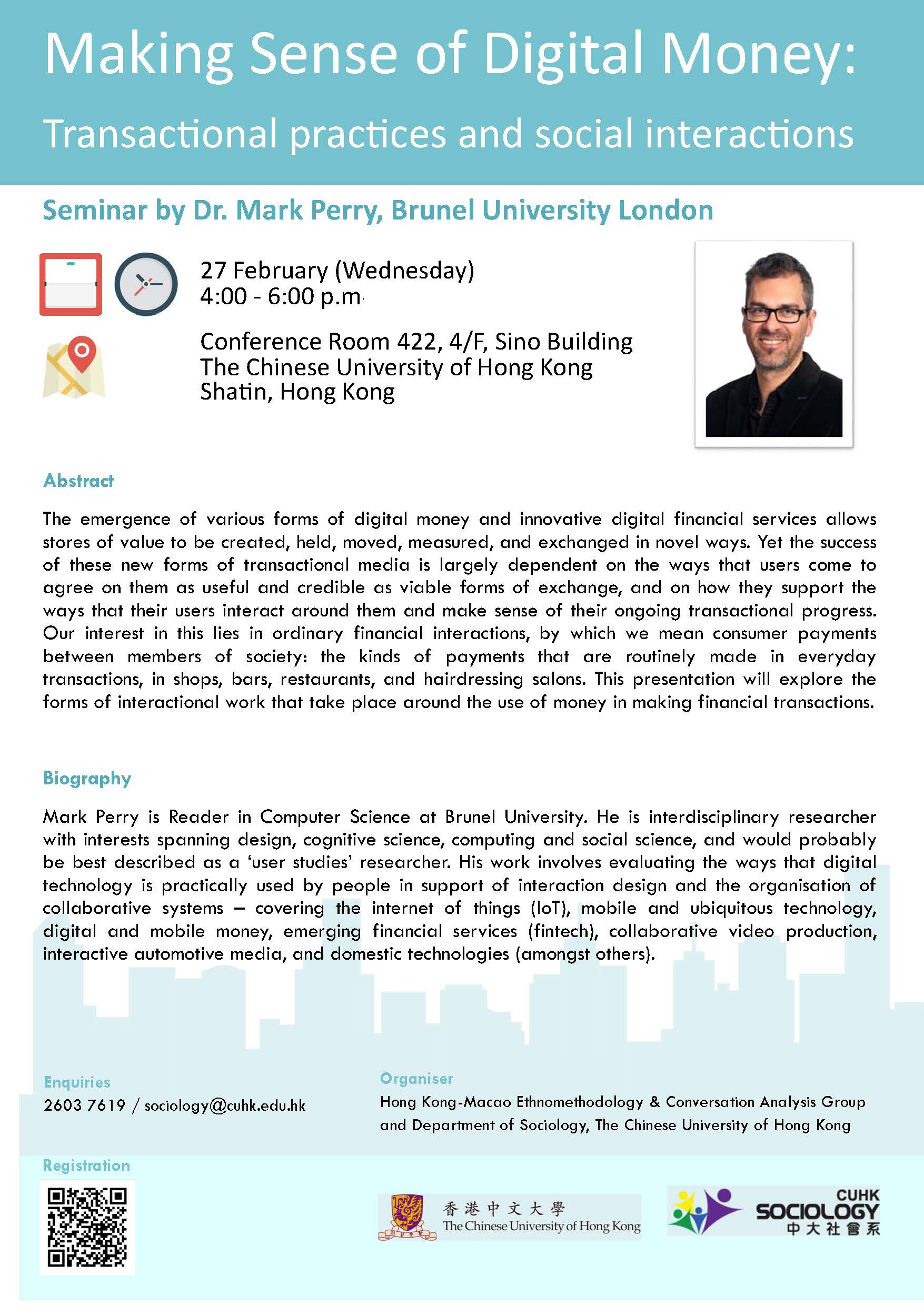
Brunel University London
sociology@cuhk.edu.hk

Université de Louvain (Belgium)
sociology@cuhk.edu.hk
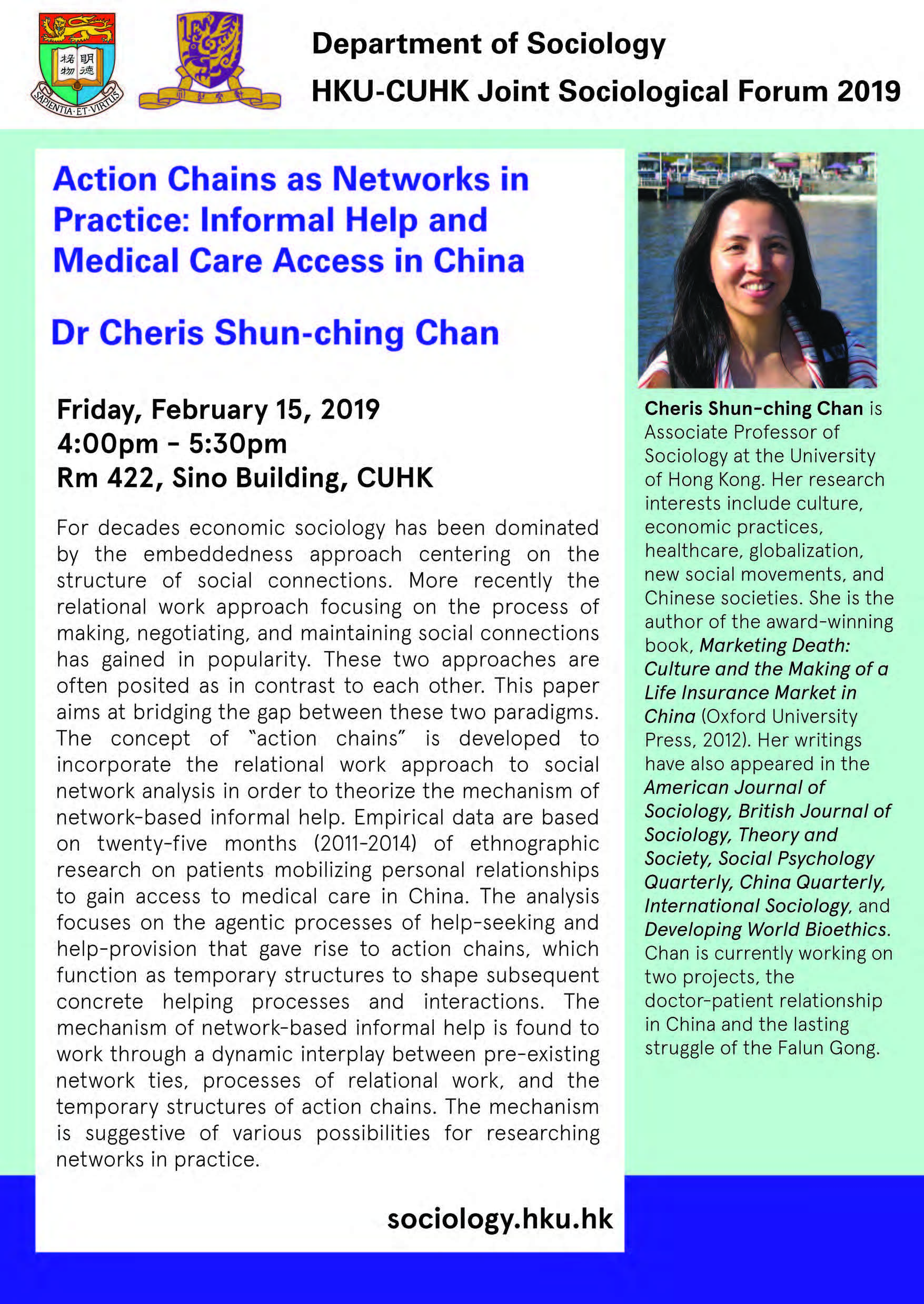
University of Hong Kong
sociology@cuhk.edu.hk

Chinese University of Hong Kong
sociology@cuhk.edu.hk

Beijing Normal University
rcmm@cuhk.edu.hk
rcmm@cuhk.edu.hk

The Johns Hopkins University
sociology@cuhk.edu.hk

Professor of Sociology, Peking University
rcmm@cuhk.edu.hk

Professor of Sociology, University of Michigan, Ann Arbor
sociology@cuhk.edu.hk

The University of Auckland
rcmm@cuhk.edu.hk

Professor of Economic Sociology, Friedrich-Alexander-University, Erlangen-Nürnberg
sociology@cuhk.edu.hk

rcmm@cuhk.edu.hk

Professor Zixi Liu, Department of Sociology and Social Work, Xiamen University
rcmm@cuhk.edu.hk

Department of Sociology, University of Hong Kong
sociology@cuhk.edu.hk

Associate Professor at Department of Development Economics, The State Islamic University (UIN), Jakarta
rcmm@cuhk.edu.hk
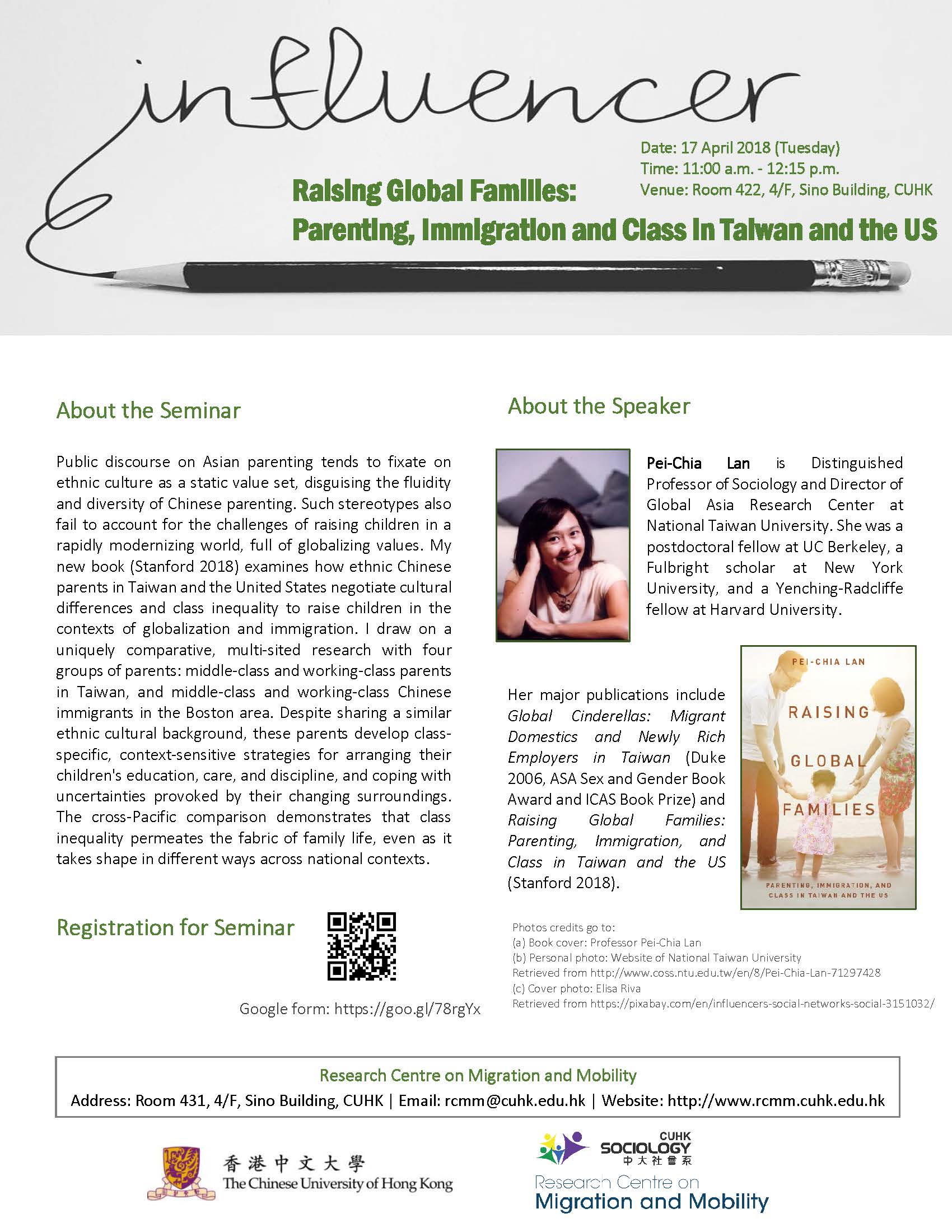
Distinguished Professor of Sociology and Director of Global Asia Research Center at National Taiwan University
rcmm@cuhk.edu.hk

Co-director of the Cities Programme and Associate Professor in Sociology at the London School of Economics and Political Science (LSE)
rcmm@cuhk.edu.hk

Professor of Economics at the University of Auckland
rcmm@cuhk.edu.hk

Department of Sociology, Hong Kong Baptist University
sociology@cuhk.edu.hk

Eastern Scholar Professor, Professor of Sociology, School of Sociology and Political Science, Shanghai University
sociology@cuhk.edu.hk

Chair in Comparative Sociology, University of Mannheim
sociology@cuhk.edu.hk

Professor and Chair, Department of Sociology, Peking University
sociology@cuhk.edu.hk
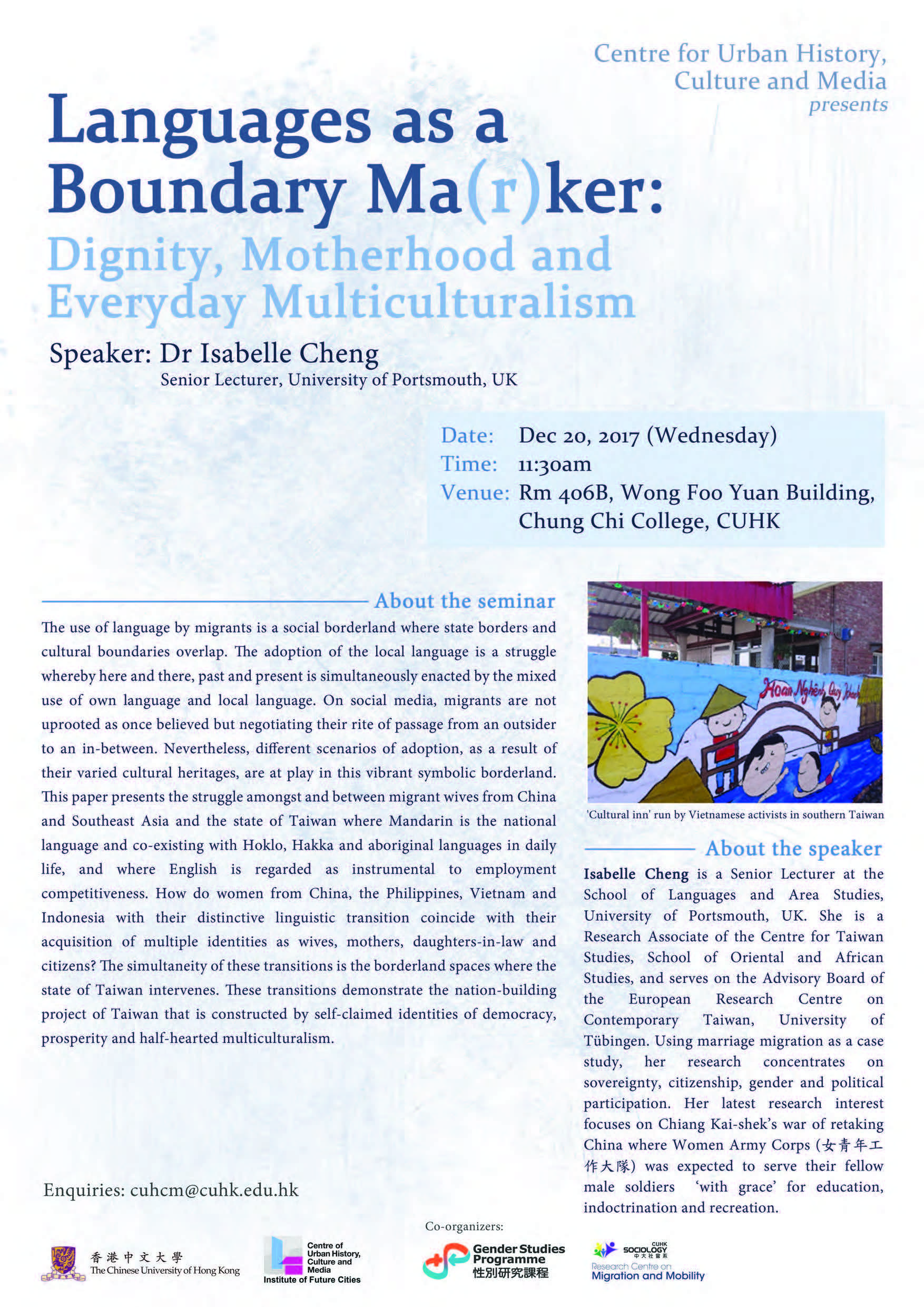
Senior Lecturer, University of Portsmouth, UK

School of Social Sciences, Singapore Management University
sociology@cuhk.edu.hk

Rector, University of New York Tirana

Professor of Criminology at the Institute of Criminology, Victoria University of Wellington
sociology@cuhk.edu.hk
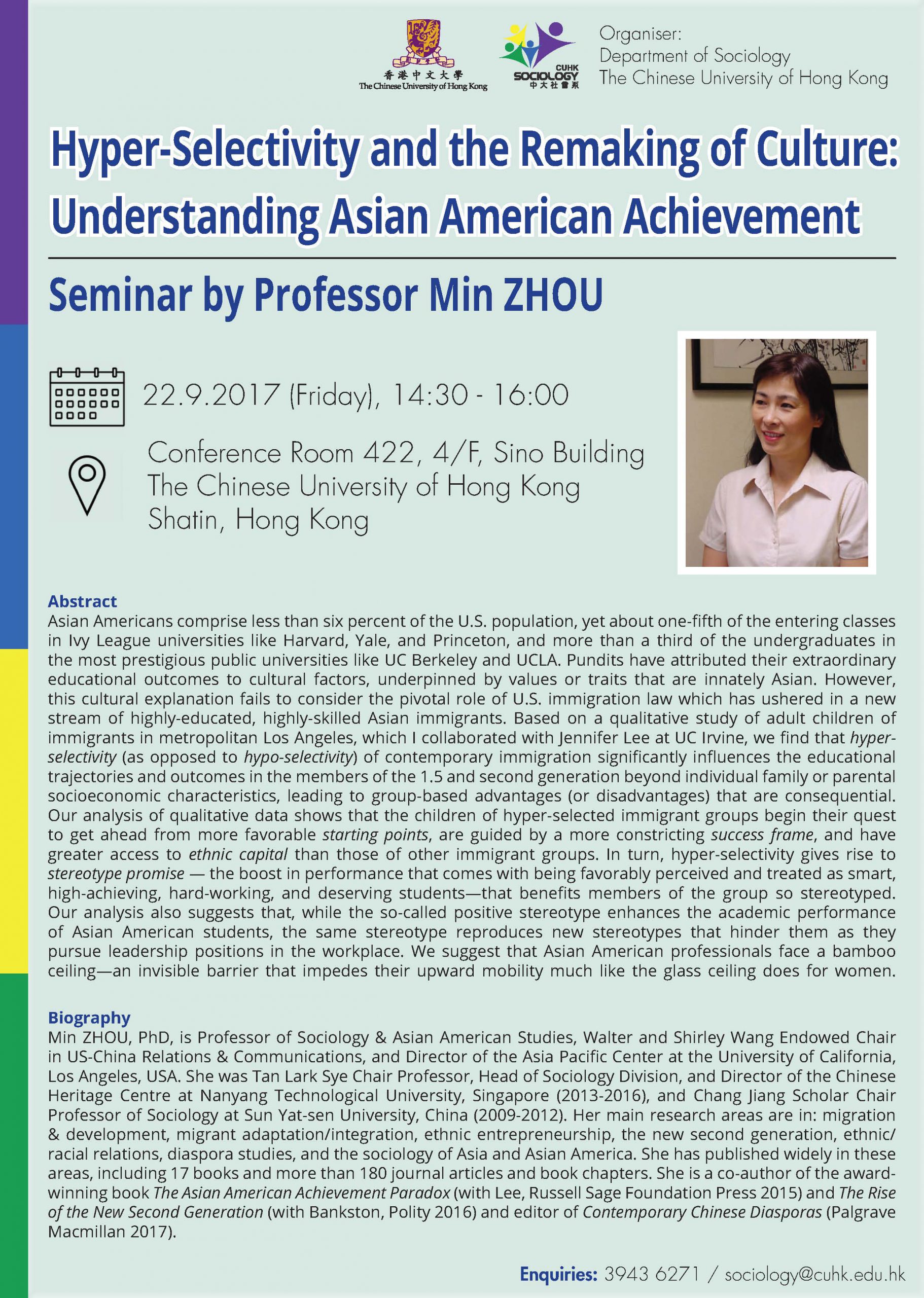
Professor of Sociology & Asian American Studies at UCLA
sociology@cuhk.edu.hk

Harvard University
Assistant Professor of Sociology at National Taiwan University
sociology@cuhk.edu.hk

Associate Professor, Director of Women's Studies Program at Aburn University

Assistant Professor of Sociology at National Taiwan University
sociology@cuhk.edu.hk

Professor Emerita at Department of Geography, National Taiwan University, Taiwan
rcmm@cuhk.edu.hk

Editor, Gender & Society
Professor of Sociology and Director of Women and Gender Studies, Oakland University
sociology@cuhk.edu.hk

Editor, Gender & Society
Professor of Sociology and Director of Women and Gender Studies, Oakland University
sociology@cuhk.edu.hk
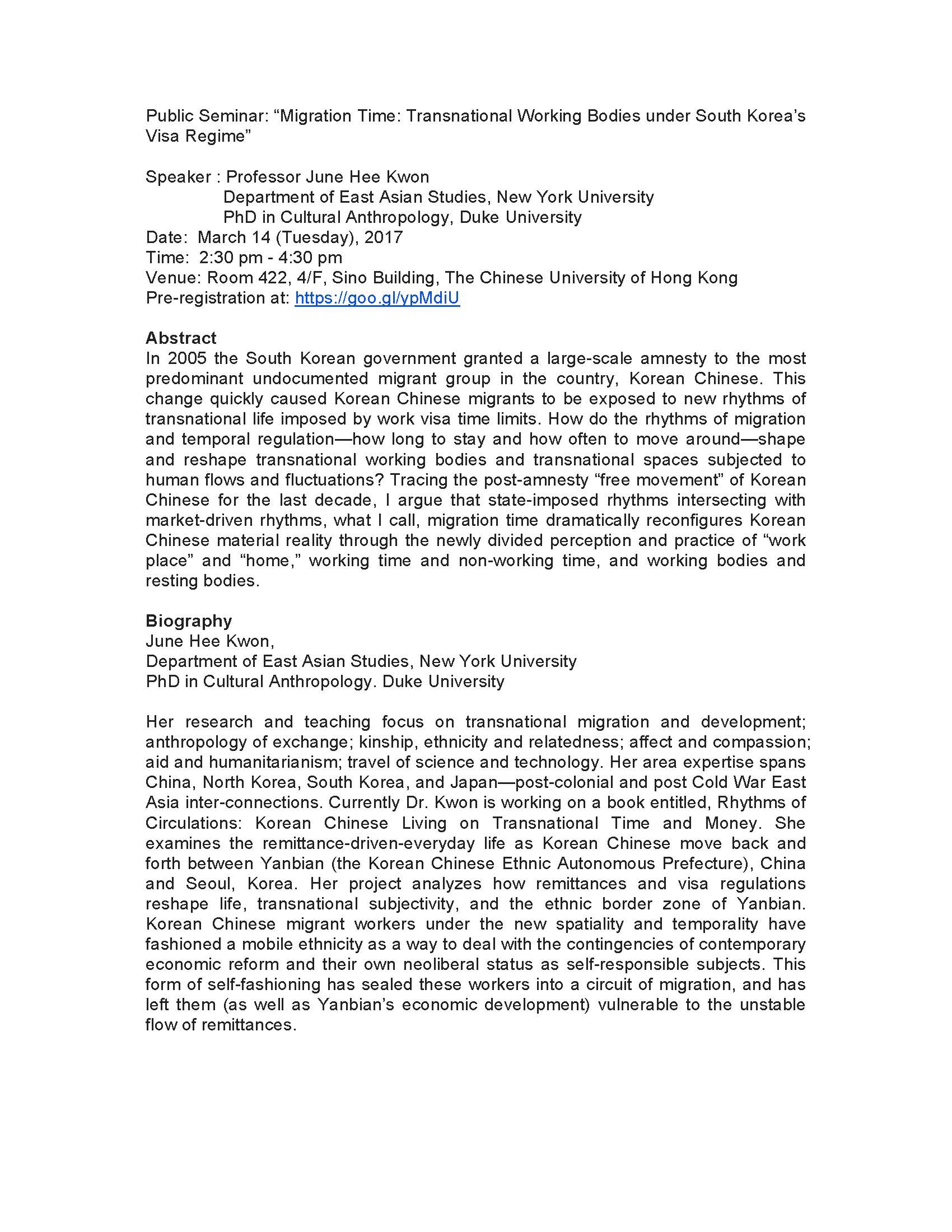
Department of East Asian Studies, New York University
rcmm@cuhk.edu.hk

Michigan State University
sociology@cuhk.edu.hk

Professor of Sociology, University of Sydney

sociology@cuhk.edu.hk

sociology@cuhk.edu.hk


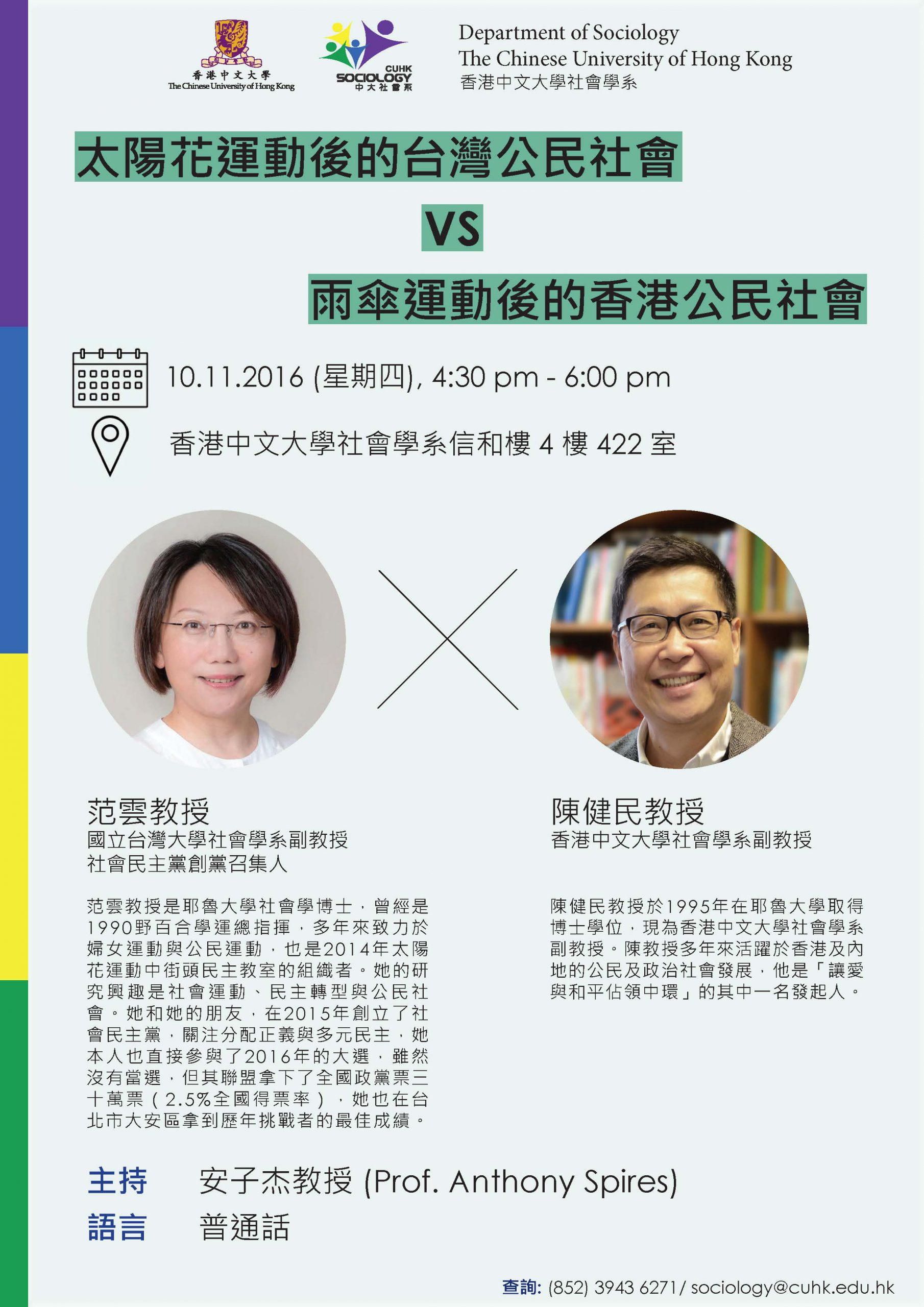
陳健民教授 (香港中文大學社會學系副教授)
sociology@cuhk.edu.hk

Professor of Sociology, Yale University
sociology@cuhk.edu.hk
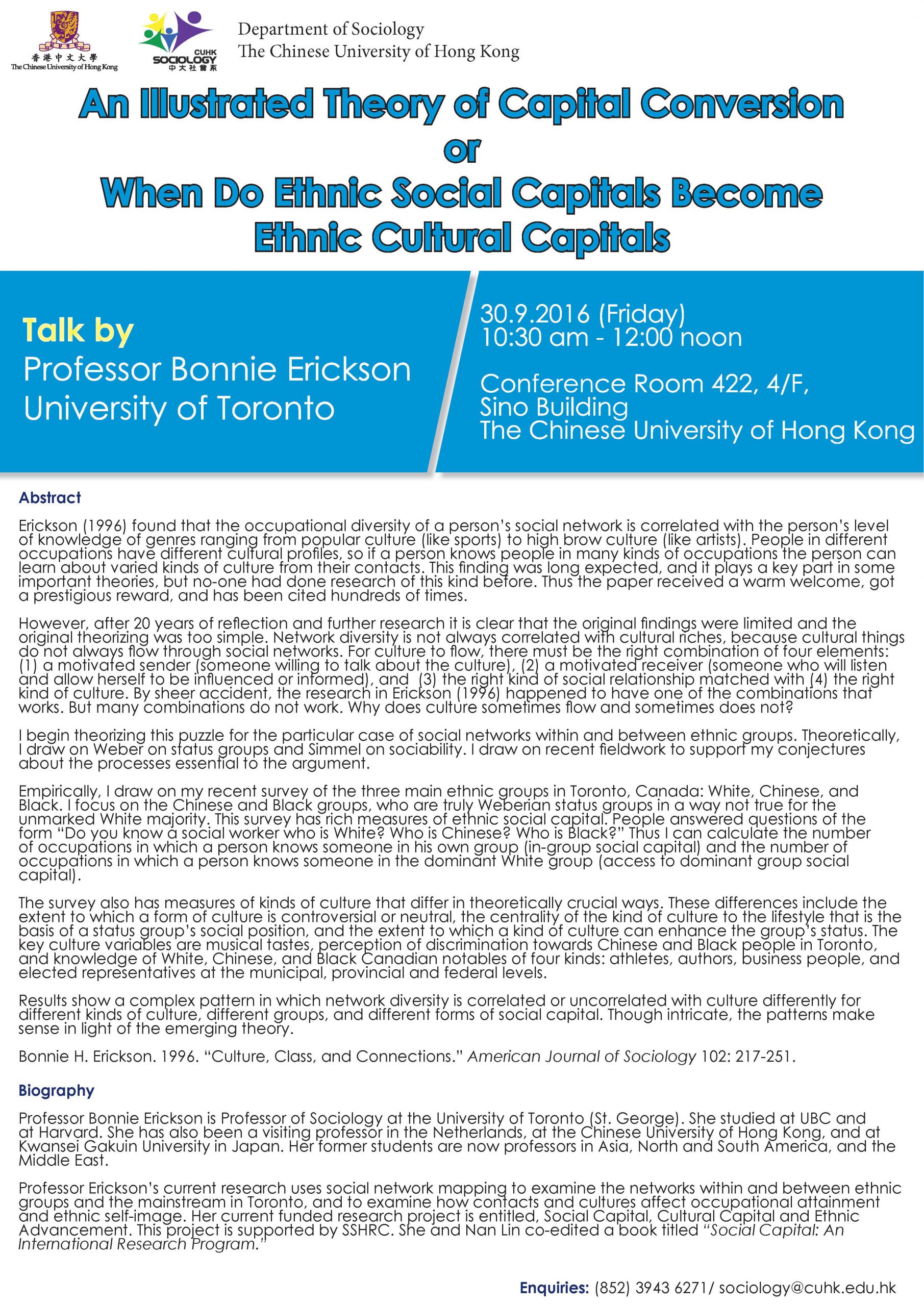
Professor of Sociology, University of Toronto
sociology@cuhk.edu.hk

Gustavus F. and Ann M. Swift Distinguished Service Professor, Department of Sociology, University of Chicago
sociology@cuhk.edu.hk
sociology@cuhk.edu.hk

台大社會系副教授,社會民主黨創黨召集人
sociology@cuhk.edu.hk

sociology@cuhk.edu.hk

中國社會科學院社會學研究所社會心理學研究室主任
sociology@cuhk.edu.hk

University of Illinois at Urbana-Champaign
sociology@cuhk.edu.hk
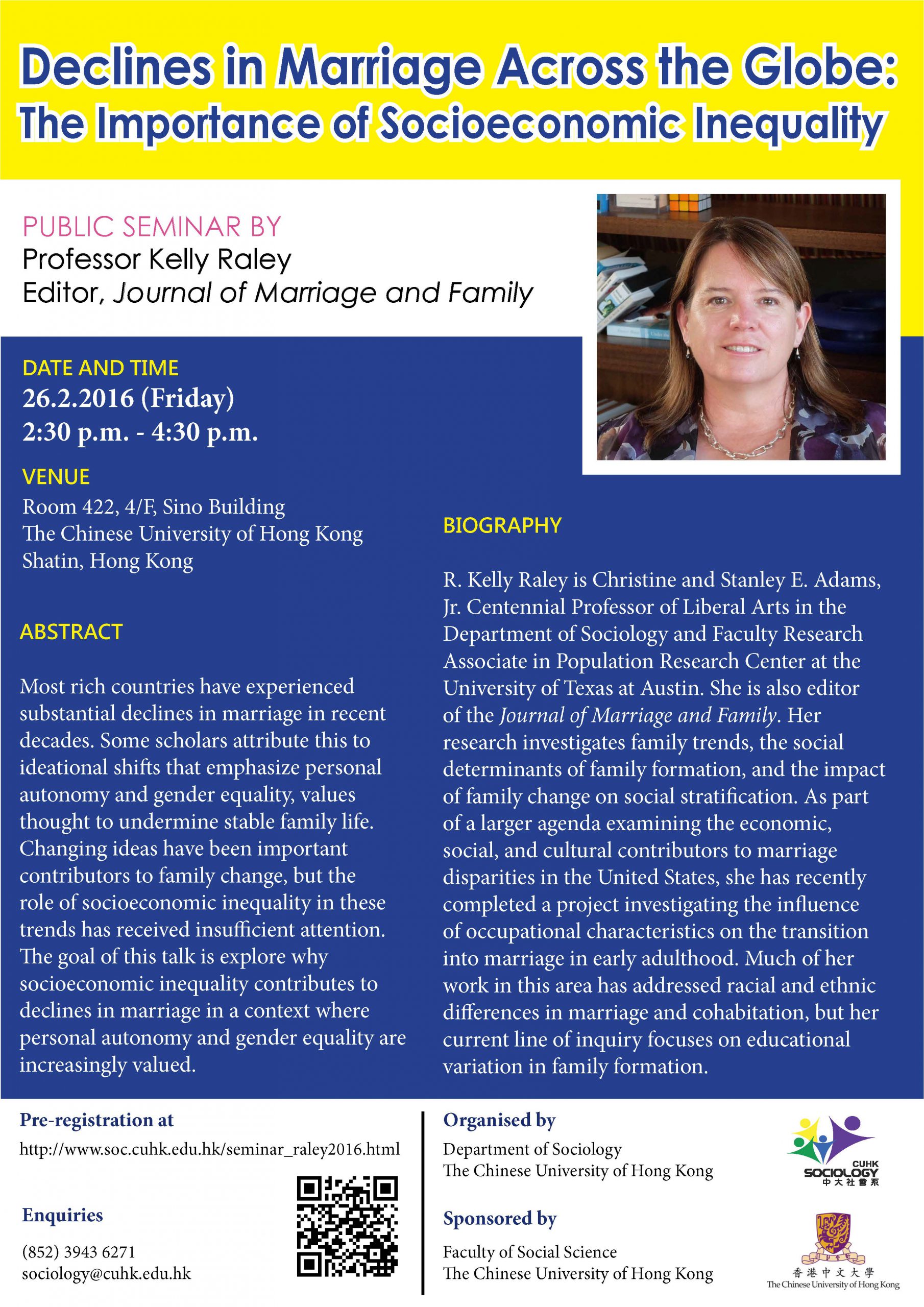
Editor of Journal of Marriage and Family
sociology@cuhk.edu.hk

Parent Academy of Hong Kong Education City co-organised a Parent Seminar: Liberal Studies in Everyday Life with Hong Kong Liberal Studies Teachers’ Association on 4 July 2015. Prof. Stephen Wing-kai CHIU of our Department gave a talk entitled “Do’s and Don’ts for Parents of Liberal Studies Students” during the seminar. The talk was delivered to parents to explain the role of them in their children’s Liberal Studies learning. Around 150 parents participated in this seminar and shared their experiences with Prof. Chiu.

University of Illinois at Urbana-Champaign
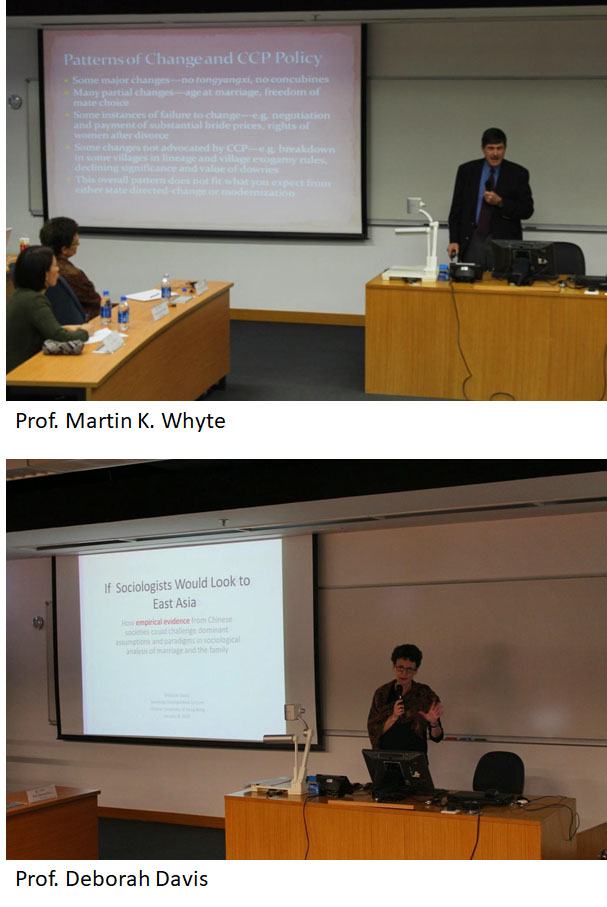
Professor Deborah Davis, Yale University
The Department is privileged to have invited Prof. Martin K. Whyte, John Zwaanstra Professor of International Studies and Sociology at Harvard University, and Prof. Deborah Davis, Professor of Sociology at Yale University, as guest speakers for the Sociology Distinguished Lecture entitled “Family Transitions in China since 1949” on 8 January 2015. Prof. Whyte presented a lecture on “Understanding Family Change Patterns in the PRC”. Prof. Davis presented a lecture on “Sociologists Look East: How Empirical Evidence on Chinese Families Can Challenge Dominant Assumptions and Paradigms in the Study of Marriage and the Family”. The lecture drew an audience of over 100 participants.
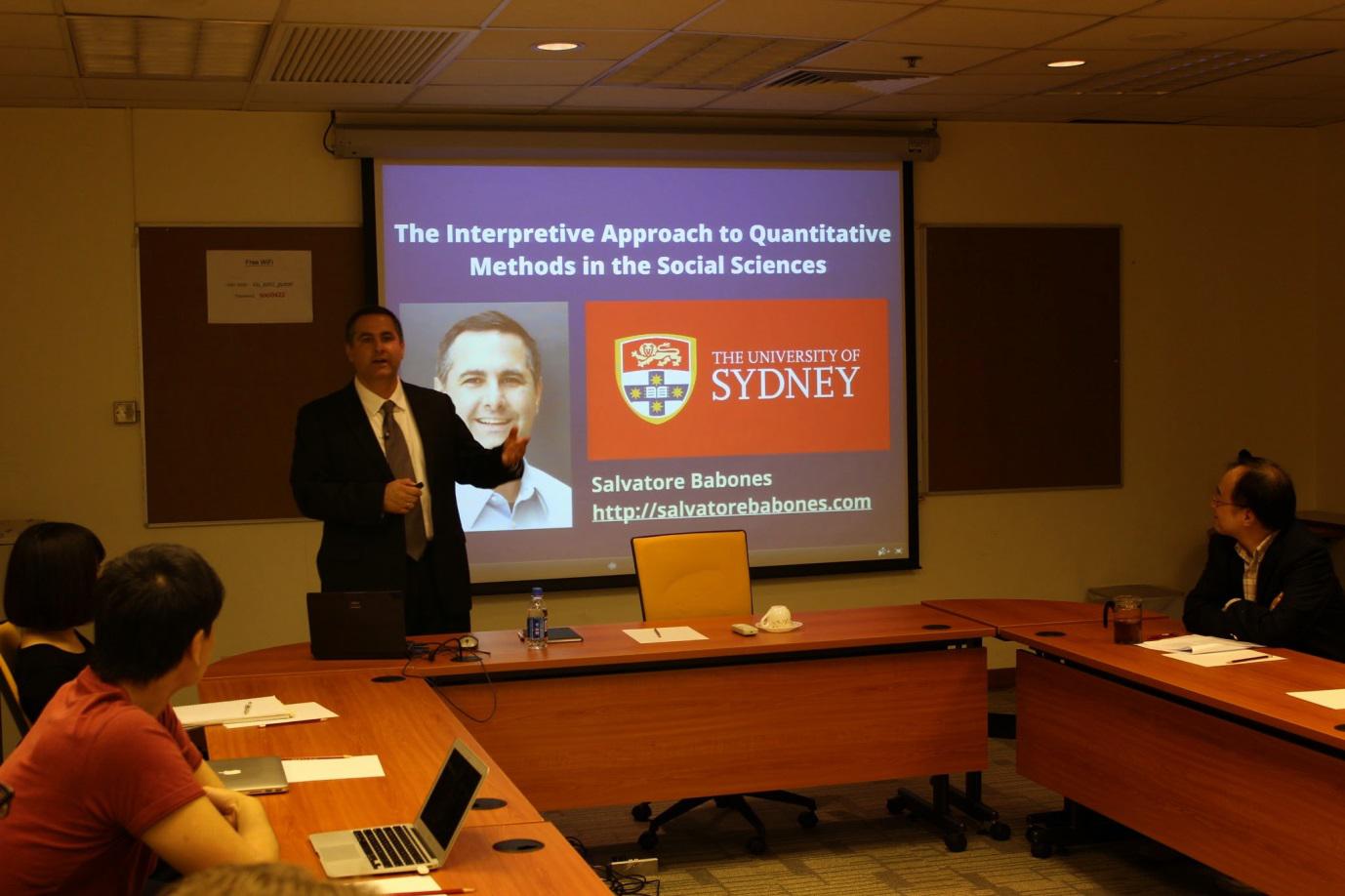
Sociology and Social Policy at the University of Sydney
Prof. Salvatore Babones, Associate Professor of Sociology and Social Policy at the University of Sydney, visited the Department and presented a talk on “Interpretive Approaches to Quantitative Methods in the Social Sciences” on 27 November 2014. Prof. Babones also conducted a workshop on “Publishing in International Journals in Sociology” for postgraduate students of the Department on 2 December 2014.

University of North Carolina, Chapel Hill
Prof. Guang Guo, Dr. George and Alice Welsh Distinguished Professor of Sociology at University of North Carolina, Chapel Hill, visited the Department and presented a public seminar on “Sociology and Genomic Research” on 13 October 2014.

Emeritus Professor at Australian National University
Department of Sociology organized a workshop entitled “Cybercrime: Evolution and International Response” on 19 September 2014. Prof. Peter Grabosky, Emeritus Professor at Australian National University gave a presentation on “The Evolution of Cybercrime, 2004-2014”, and Prof. Gregor Urbas, Associate Professor of Law at University of Canberra, gave a presentation on “Responding to Cyber-Attacks: The role of International and Domestic Law”. Dr. Laurie Lau, Honorary Research Fellow of the Pearl River Delta Social Research Centre of the Department , served as the moderator of the workshop.

Professor of Sociology and African and African American Studies at Harvard University
Prof. Michèle Lamont, Professor of Sociology and African and African American Studies and Robert I. Goldman Professor of European Studies at Harvard University, visited the Department and presented a public seminar on “The Quest for Equality and Respect: Responding to Stigmatization and Discrimination in United States, Brazil and Israel” on 2 September 2014.

Johns Hopkins University
Prof. Lingxin Hao, Professor of Sociology at Johns Hopkins University, visited the Department and presented a talk on “China’s Rural-Urban Migration and Children’s Access to Compulsory Education: Policy Evolution and Consequences” on 11 August 2014




socrpg@cuhk.edu.hk
Abstract
This study examines whether cognitive status and change are associated with social ties, social engagement, and lifestyle factors among middle aged and older Americans in the general population and individuals with mild cognitive impairment (MCI) at the baseline. Data used are from the second (collected in 2010-2011) and third (2015-2016) waves of the National Social Life, Health, and Aging Project (NSHAP) conducted by investigators at the University of Chicago. Cognitive health is measured using the Montreal Cognitive Assessment (MoCA). The results show that having close social ties, being socially engaged, and following certain lifestyles (e.g., exercising) are prospectively linked to better cogn1tive status. Meanwhile, among the 972 participants marked with MCI at the baseline, 22.1% (N=215) became cognitively normal, and 11.5% (N=ll2) progressed into dementia five years later. Social engagement predicts a higher likelihood of transitioning from MCI to normal cognition. Having more close ties, and to a lesser extent, social engagement, appear preventive against the transition from MCI to dementia. In these transitions, the role of lifestyle factors is minimum. Social relationship and activity interventions may be fruitful for promoting cognitive health and preventing dementia in the middle and later life.
About the speaker
Ming Wen obtained a B.S. in Information Management and Information Systems from Peking University and an M.S. in Statistics and Ph.D. in Sociology from the University of Chicago. She is a professor and former chair in the Department of Sociology at the University of Utah, a former standing member of an NIH study section, and currently serving as the Deputy Editor for the Journal of Health & Social Behavior. She conducts quantitative research on various topics regarding social determinants of health and human development in the United States and China. Her US-based studies have examined neighborhood and family effects on a wide range of health and lifestyle outcomes across the life course. Her recent China-based work focuses on how rural and urban origin and residence play a role in child developmental outcomes and how living arrangements and socio-relational resources affect health and well-being among middle-aged and older adults. Her research has been supported by funding from the National Institutes of Health and private foundations. Her articles have been published in high impact journals such as Demography, Social Forces, Social Science & Medicine, Social Science & Research, Child Development, and the American Journal of Public Health.